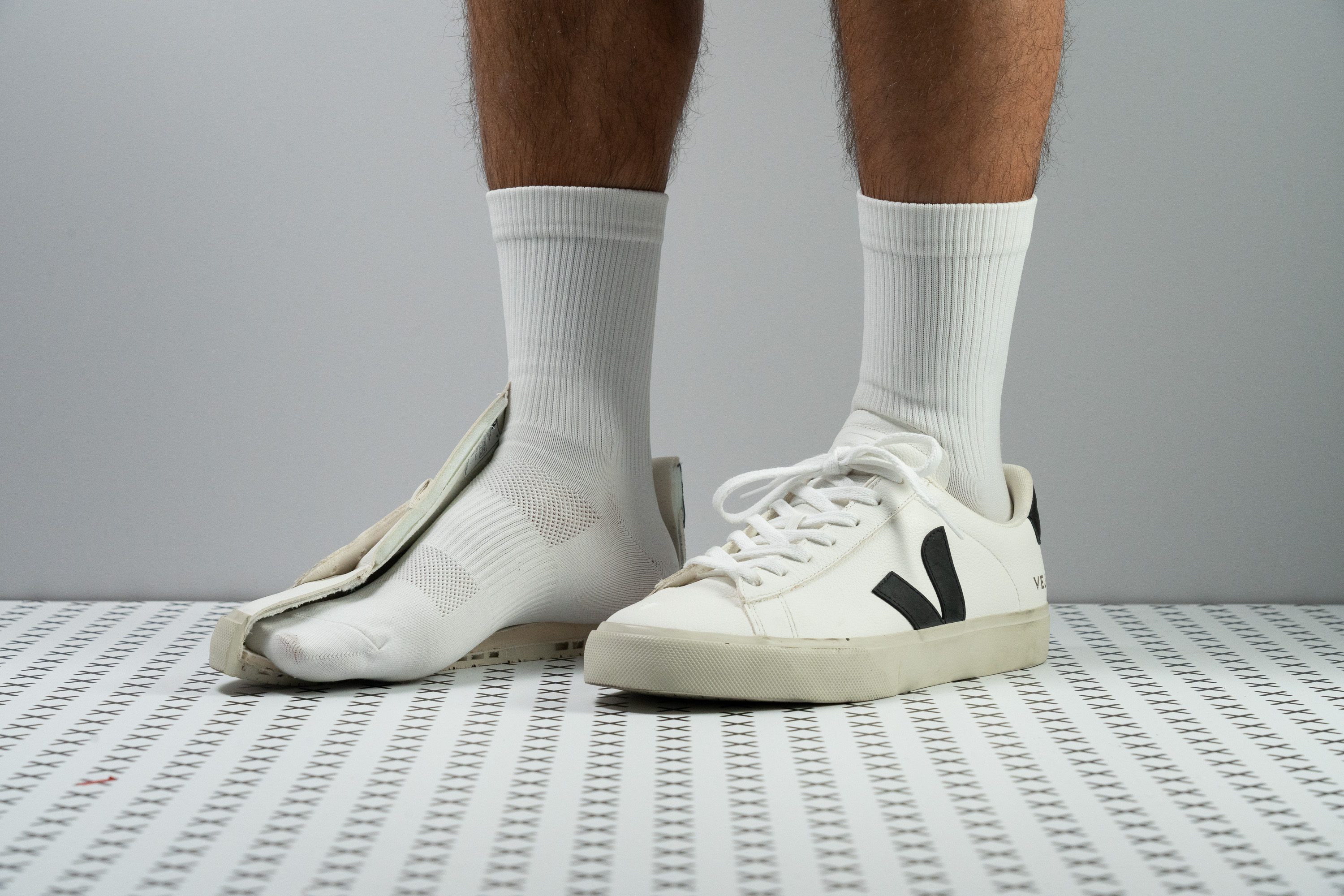Our verdict
- Top pick in best leather trainers
- Top pick in best business casual trainers
Pros
- Premium leather and craftsmanship
- Sustainable materials and manufacturing
- Clean and minimal aesthetics
- Light for a leather sneaker
- Low to the ground and stable
- Excellent durability
- Comfortably flexible
- Great outsole grip for wet and dry streets
Cons
- Not for all-day wear
- Quite expensive
- Long tongue chafes the skin
Audience verdict
Comparison
The most similar trainers compared
+ + Add a shoe | |||||
|---|---|---|---|---|---|
| Audience score | 89 Good! | 91 Great! | 93 Great! | 89 Good! | |
| Price | £125 | £130 | £120 | £130 | |
| Style | Business casualMinimalist | ClassicRetroSporty | ClassicRetroSporty | ClassicDadRetroSporty | |
| Shock absorption | Low | Low | Low | High | |
| Energy return | Moderate | Low | Moderate | Moderate | |
| Traction | High | High | Moderate | High | |
| Breathability | Warm | Warm | Moderate | Warm | |
| Weight lab | 14.5 oz / 411g | 14.5 oz / 411g | 14.8 oz / 420g | 13.5 oz / 383g | |
| Size | True to size | True to size | True to size | True to size | |
| Midsole softness | Firm | Balanced | Firm | Firm | |
| Material | CanvasVulc Sole | Cup SoleLeather | Cup SoleLeather | MeshSuede | |
| Season | SpringFall | SpringFall | SpringFall | SpringFall | |
| Inspired from | - | Basketball | Basketball | Running | |
| Width / fit | Medium | Medium | Medium | Medium | |
| Toebox width | Medium | Medium | Medium | Medium | |
| Leather/suede quality | Real leather | Real leather | Real leather | Real suede | |
| Toebox durability | Good | Decent | Decent | Decent | |
| Heel padding durability | Decent | Decent | Decent | Decent | |
| Outsole durability | Decent | Good | Decent | Good | |
| Heel stack lab | 22.3 mm | 22.9 mm | 23.1 mm | 35.4 mm | |
| Stiffness | Flexible | Moderate | Moderate | Stiff | |
| Tongue padding | Thin | Average | Average | Average | |
| Drop lab | 11.7 mm | 11.1 mm | 7.6 mm | 11.1 mm | |
| Forefoot | 10.6 mm | 11.8 mm | 15.5 mm | 24.3 mm | |
| Removable insole | ✓ | ✓ | ✓ | ✓ | |
| Heel tab | None | None | None | None | |
| Torsional rigidity | Flexible | Moderate | Moderate | Moderate | |
| Heel counter stiffness | Moderate | Stiff | Moderate | Moderate | |
| Sustainable | ✓ | ✗ | ✗ | ✗ | |
| Reflective elements | ✗ | ✗ | ✗ | ✓ | |
| Closure | Laces | Laces | Laces | Laces | |
| Top | Low top | Low top | Low top | Low top | |
| Ranking | #95 Bottom 21% | #57 Top 48% | #27 Top 23% | #85 Bottom 29% | |
| Popularity | #82 Bottom 32% | #37 Top 31% | #21 Top 18% | #9 Top 8% |
Who should buy
We believe that the Veja Campo is not a sneaker to sleep on if you are looking for the following:
- a sustainably-made pair of trainers from a recognised French brand
- a real high-quality leather (or suede) sneaker
- a classy and minimalist white kick with Stan Smith vibes
- a sneaker that can complete a business casual attire
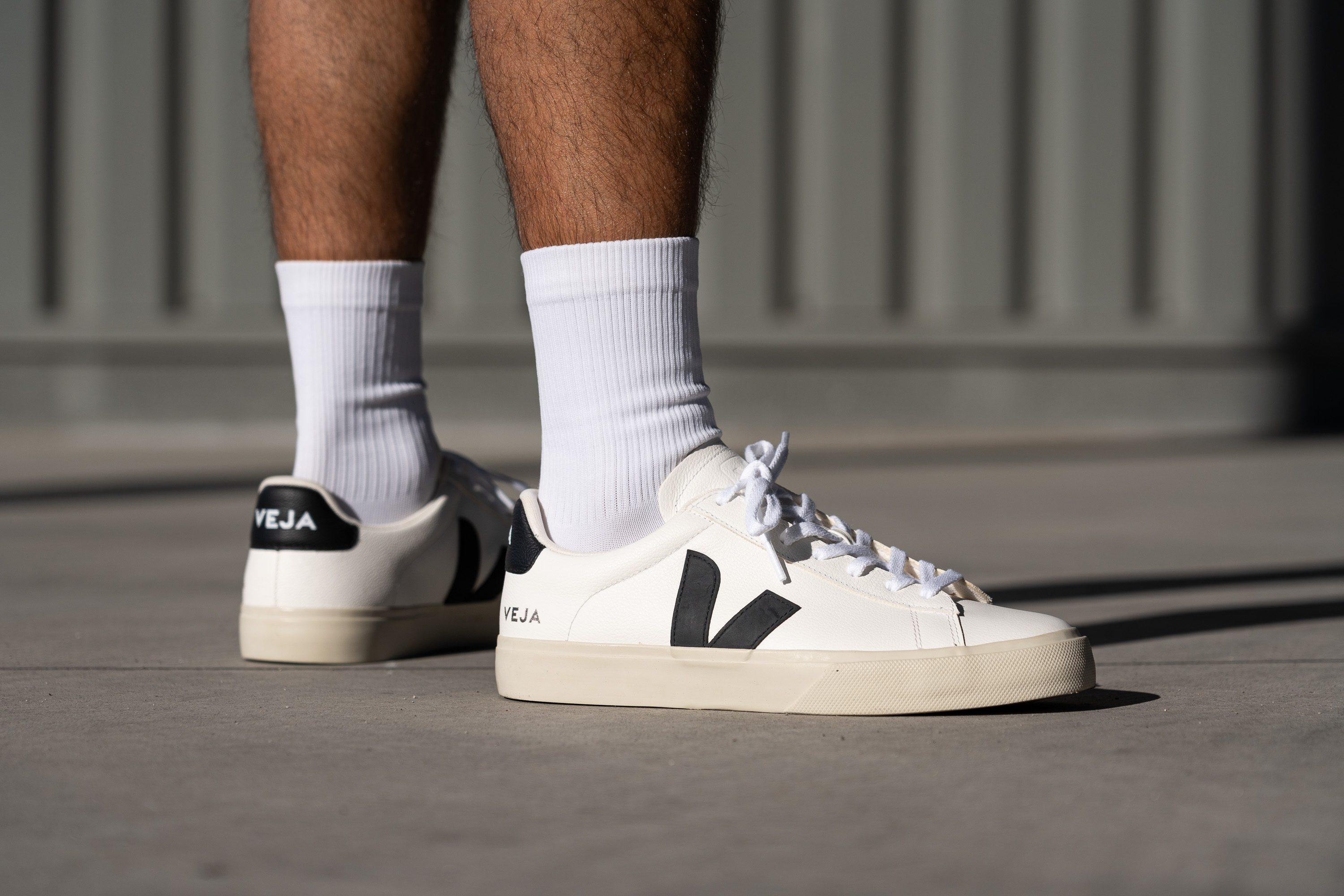
Who should NOT buy
The premium price point of Veja trainers can be off-putting for many people. Not everyone is ready or willing to spend £180 on a pair of kicks even if it comes from a sustainability-oriented French company that uses ethically sourced materials and high-quality leather.
Luckily, the Campo is also available in a Canvas option with a much more affordable price of £140. Ot consider the Veja Esplar (£130).
Alternatively, you can always rely on the evergreen Adidas Stan Smith or Gazelle. For only £100 these shoes are always a safe bet.
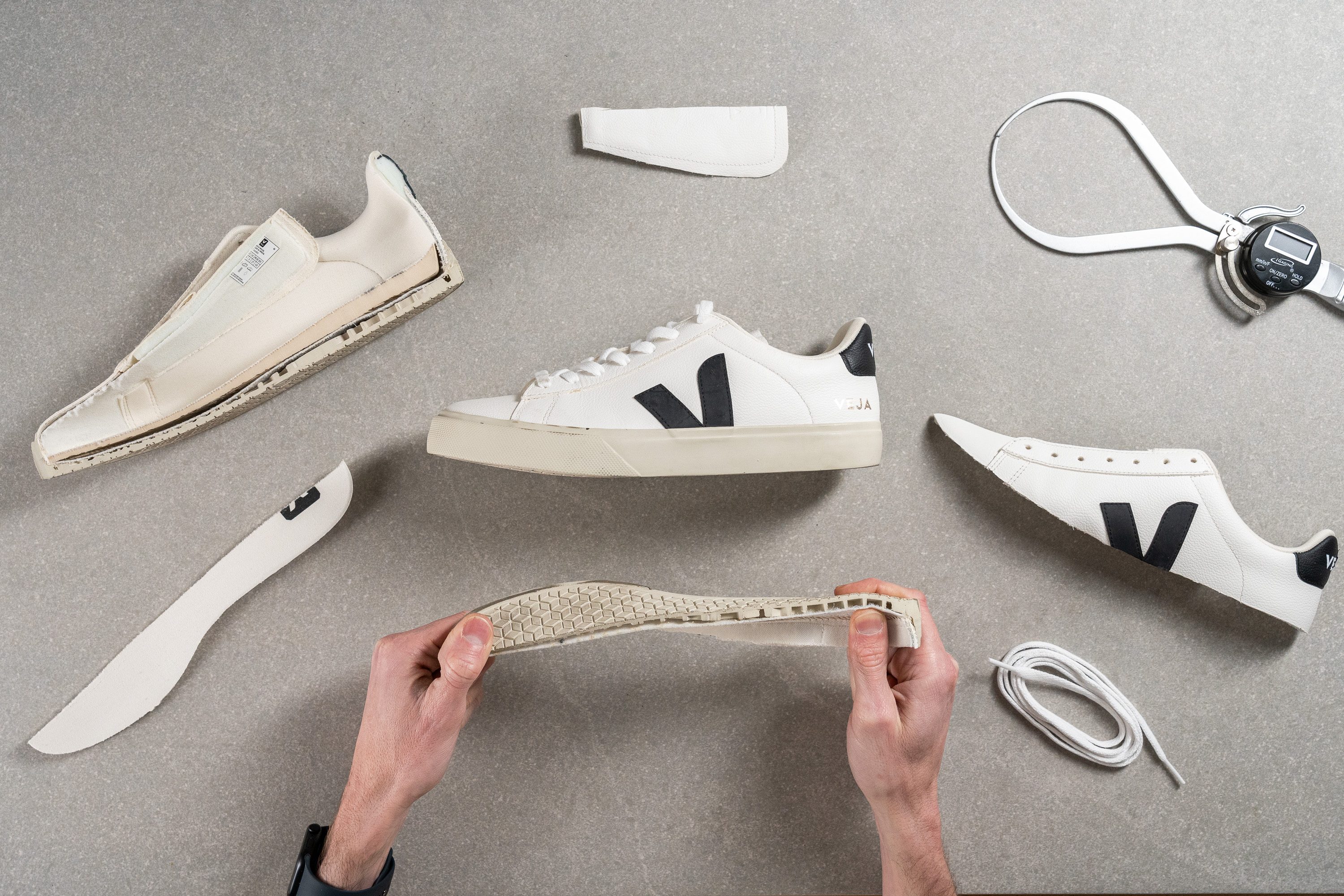
Cushioning
Shock absorption
Even though the VEJA Campo features a thick foam insole for underfoot cushioning, its capacity is limited given the kick's rubber-based sole.
Our shock absorption tests returned a below-average measurement of 62 SA, which means that this VEJA shoe fails to provide the same level of impact protection as many other casual trainers.
While it offers the benefit of a clean and minimal silhouette, it is not the best option for all-day wear.
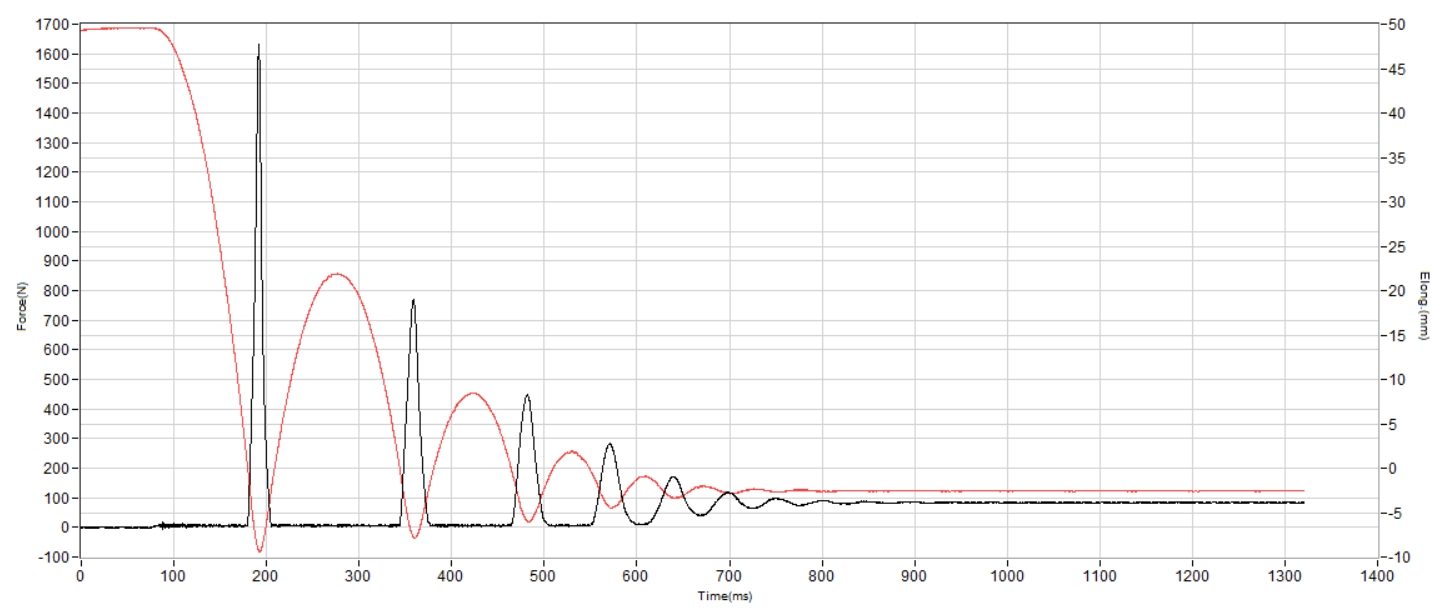
| Campo | 62 SA |
| Average | 89 SA |
Energy return
On a positive note, the shoe's platform doesn't feel completely dead as it offers a decent rebound for a lifestyle sneaker. With an energy return of 50%, we found it to be on par with the category average.
| Campo | 50.1% |
| Average | 50.2% |
Heel stack
As a minimalist sneaker, the Veja Campo sits very close to the ground.
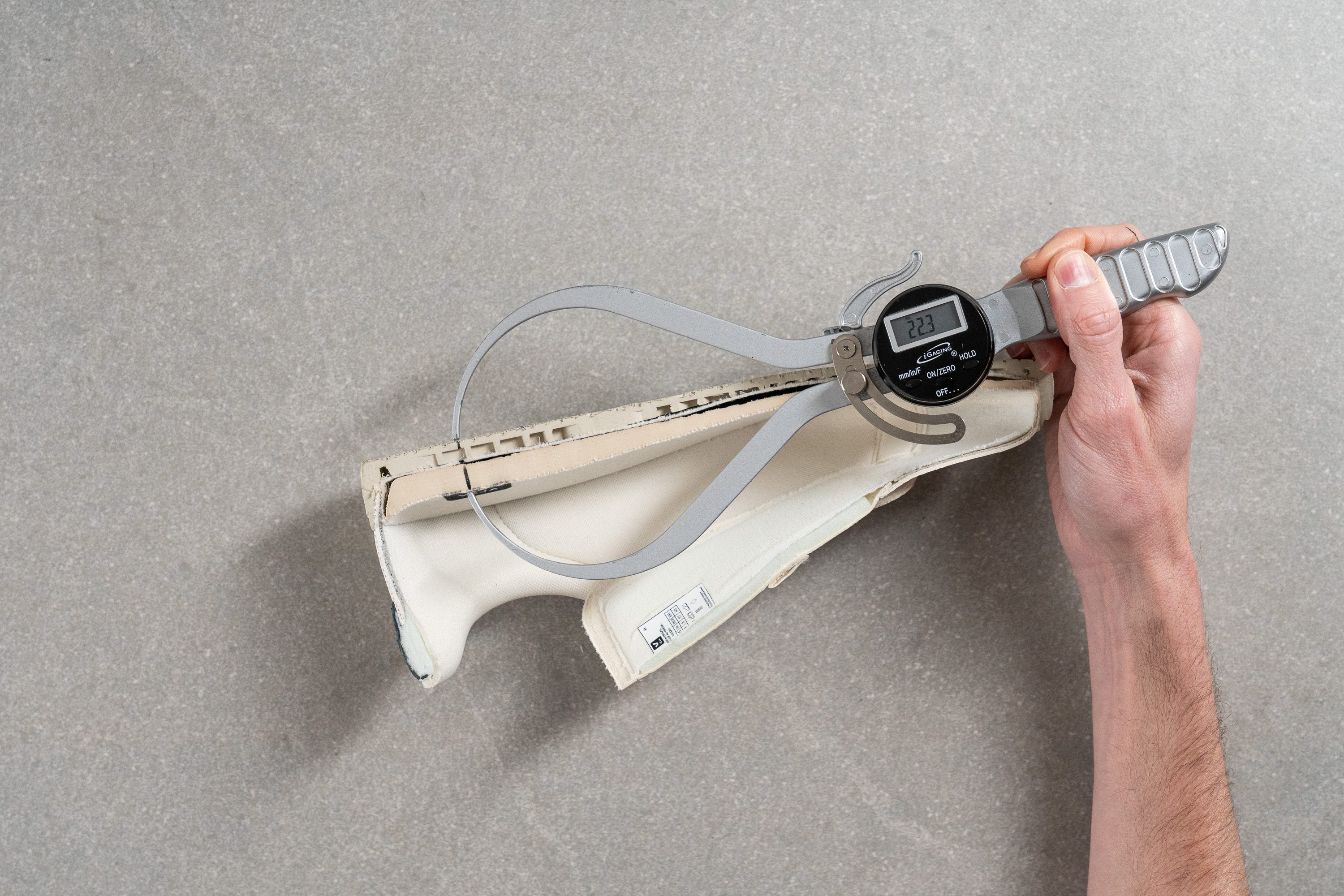
At 22.3 mm, its heel stack is on the lower end of the sneaker spectrum, between the Adidas Samba (20.3 mm) and the Air Jordan 1 Low (22.9 mm).
| Campo | 22.3 mm |
| Average | 30.7 mm |
Forefoot stack
The shoe also features some of the lowest forefoot stacks in the industry, putting the ball of the foot only 10.6 mm away from the ground.
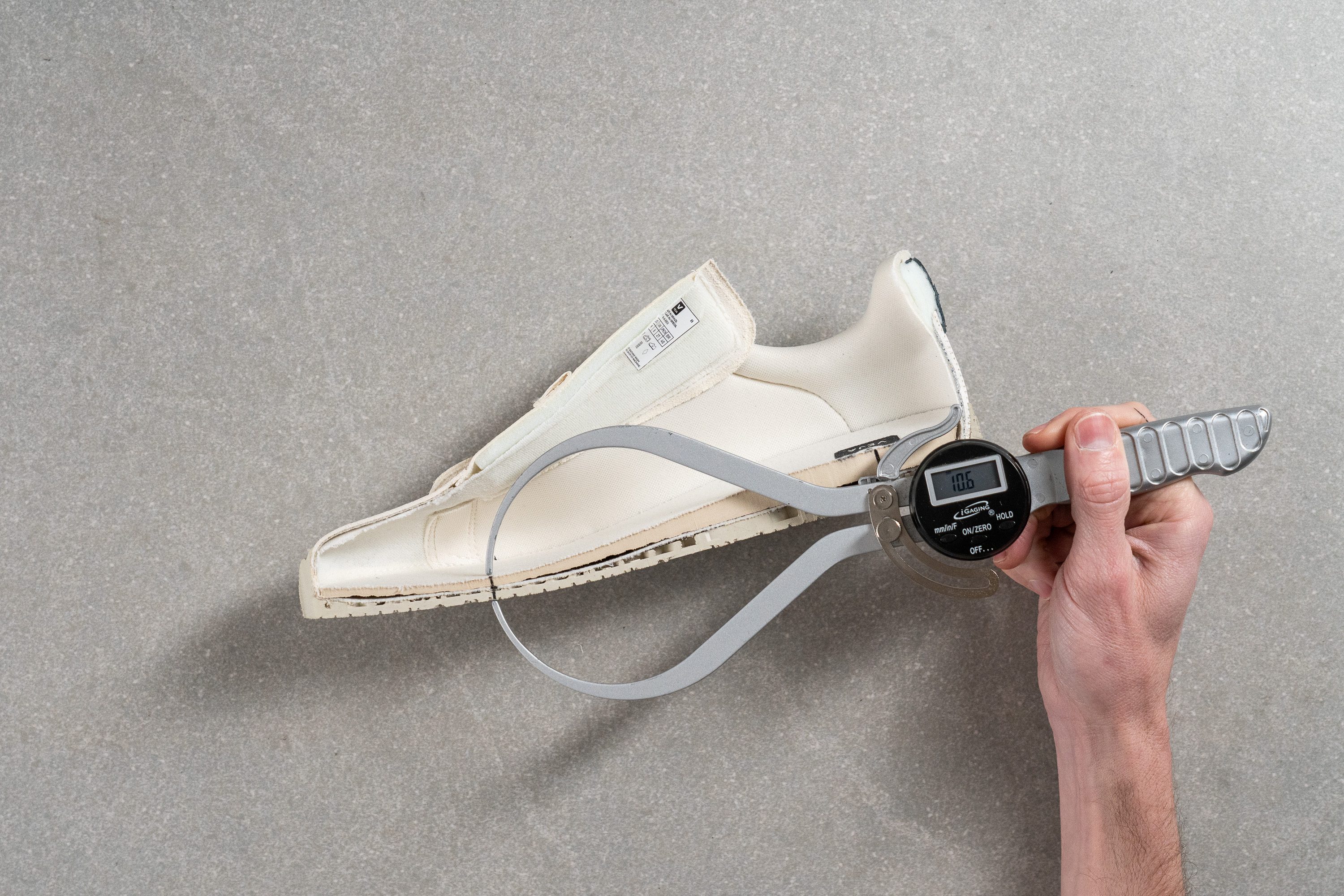
It feels almost as if there is no buffer between the floor and the foot! That's why people with foot pain or other conditions that call for cushioned and supportive footwear may want to think twice before getting the Veja Campo.
But on the other side, this sneaker feels as minimal as it can be!
| Campo | 10.6 mm |
| Average | 19.5 mm |
Drop
To make sure your heel has enough cushioning in this very grounded setup, the Campo's heel stack is notably thicker than the forefoot.
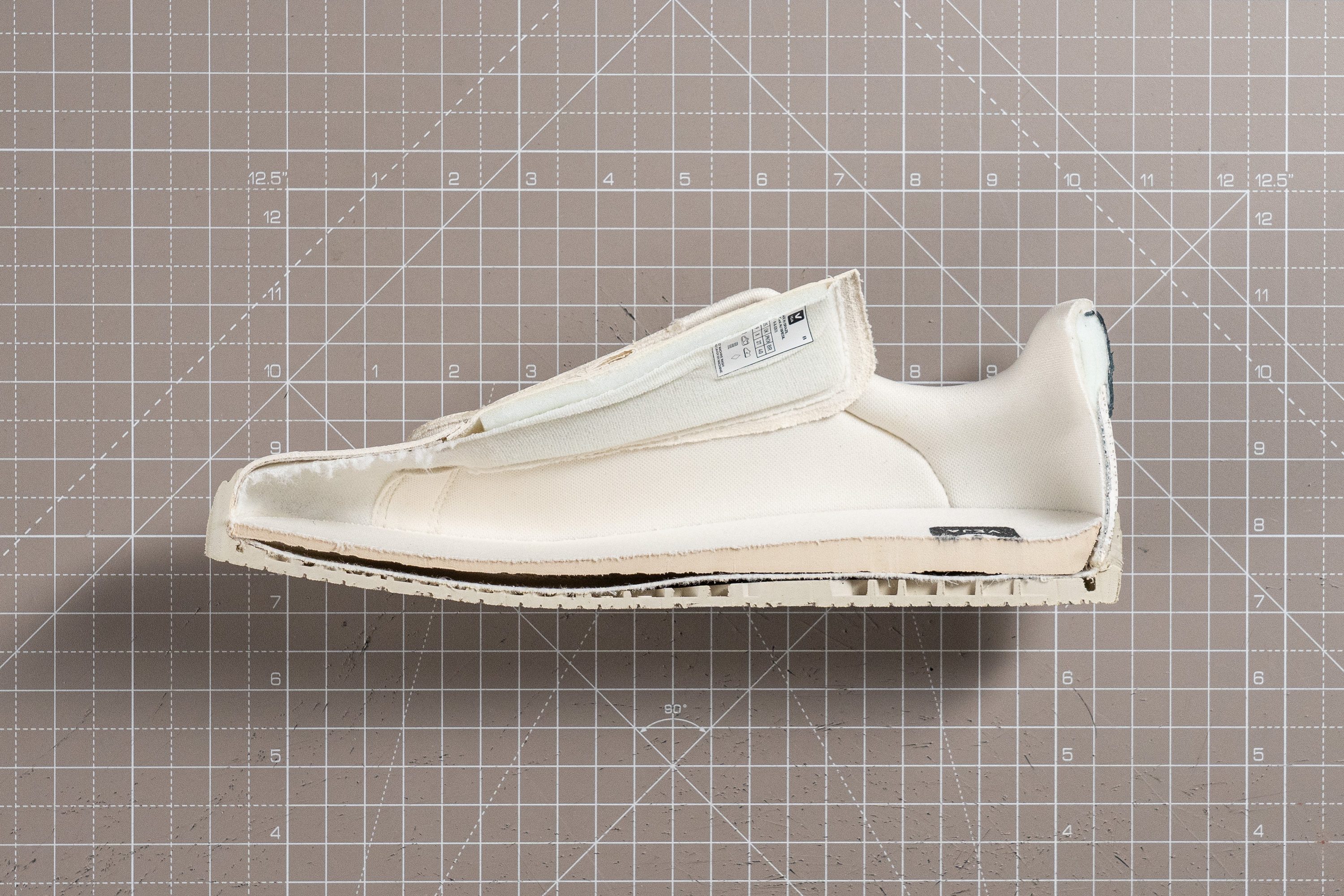
A heel-to-toe offset of 11.7 mm is very optimal for taking the pressure off the Achilles and making the heel feel more supported.
| Campo | 11.7 mm |
| Average | 11.2 mm |
Midsole softness
When half of a shoe's midsole is made of rubber, a soft ride is not to be expected.
The plush insole of the Veja Campo is hidden inside a sturdy vulcanised sole, so... please, forget about any kind of cloud-like ride! If that's what you're looking for, don't panic: here you have the trainers with the softest midsoles that have earned the VIP pass to our lab.
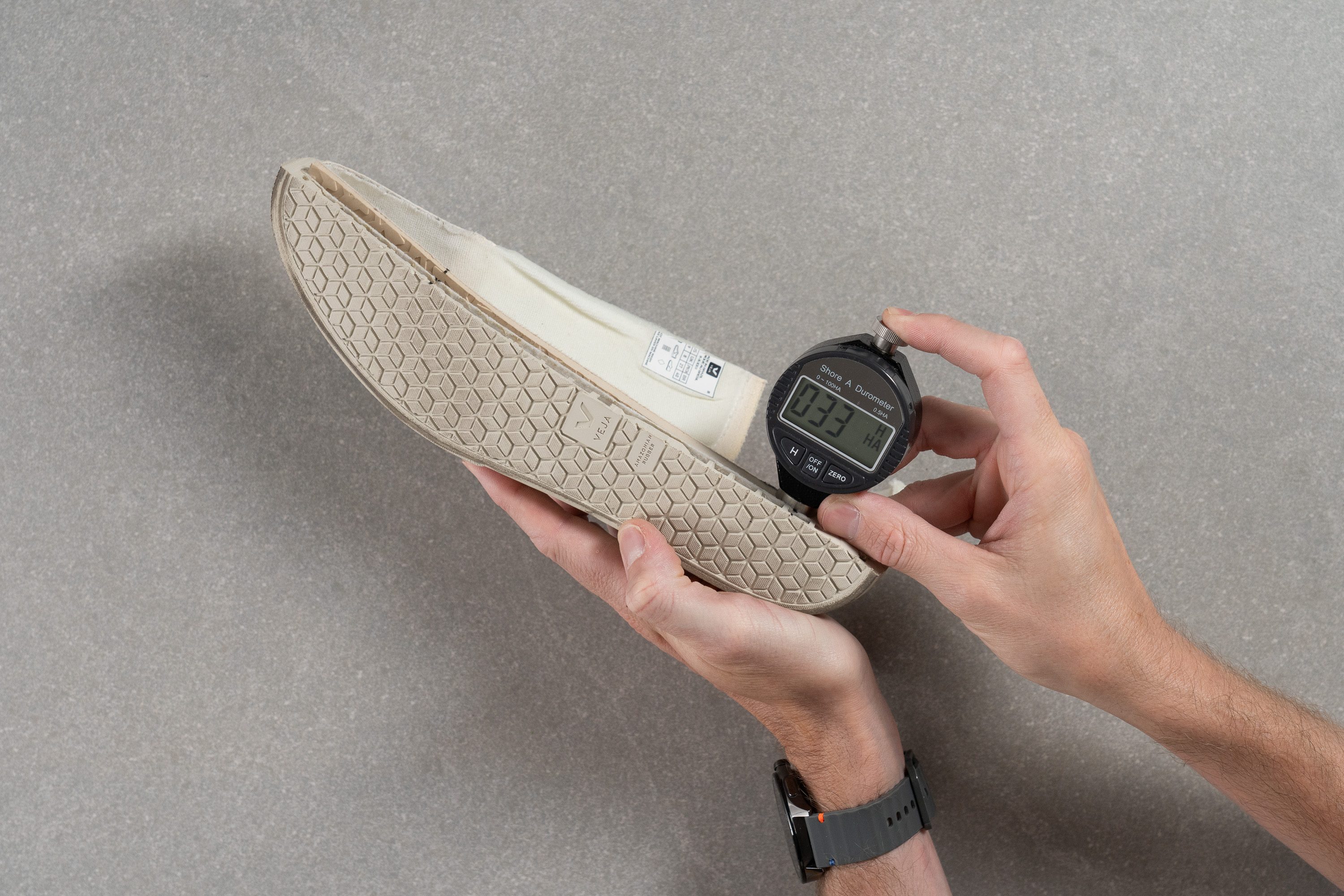
Pressing our Shore A durometer against the carrier part of the midsole, it returned 33.0 HA, which is definitely higher than average.
| Campo | 33.0 HA |
| Average | 28.6 HA |
Size and fit
Size
VEJA Campo fits true to size (166 votes).
Internal length
Trying the Veja Campo in our regular men's US size 9, we found that it runs precisely true to size.
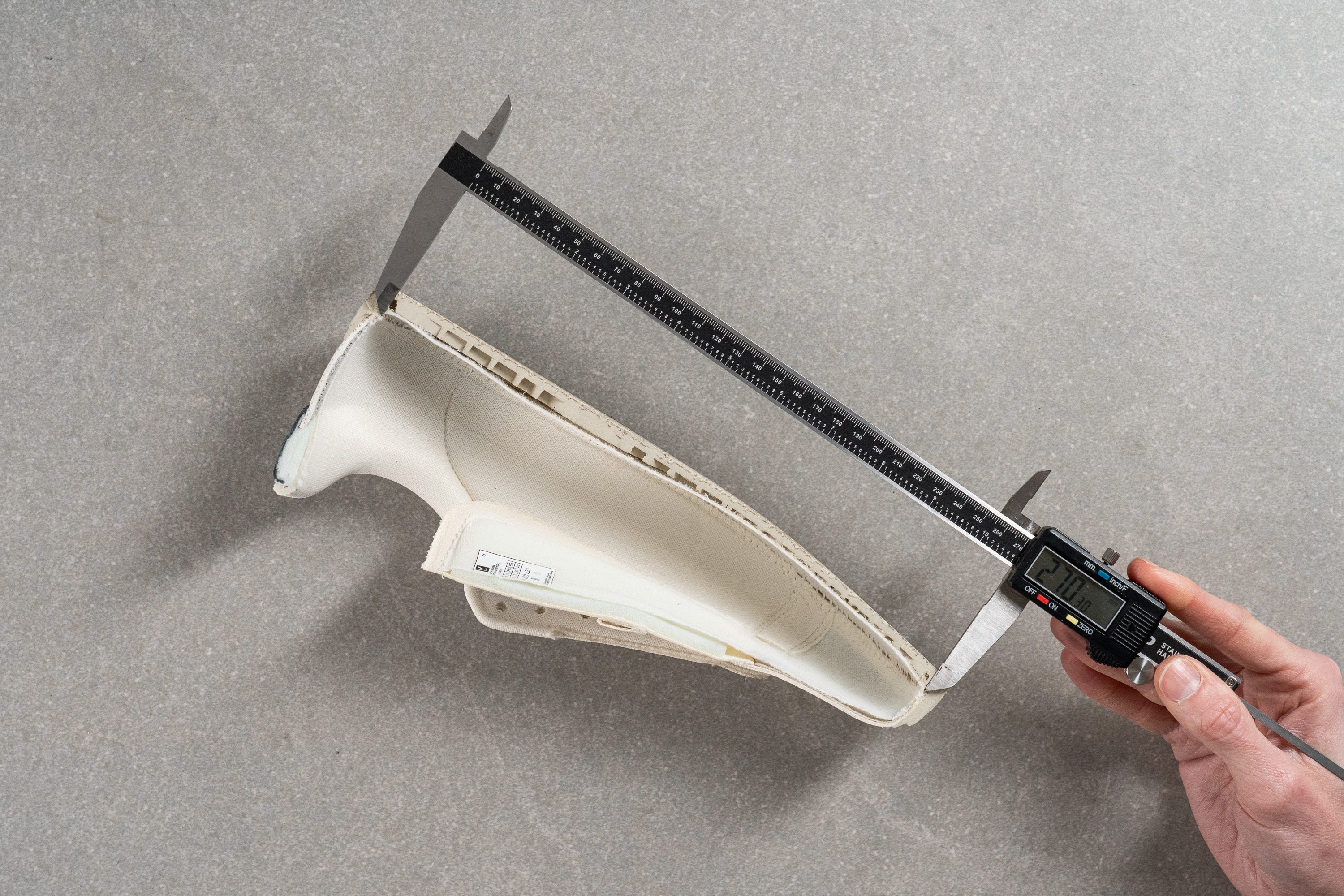
In our lab, we also recorded its internal length at 270.3 mm. This corresponds to the stated 27 CM on the box which is the equivalent of our US size 9 or EU size 42.
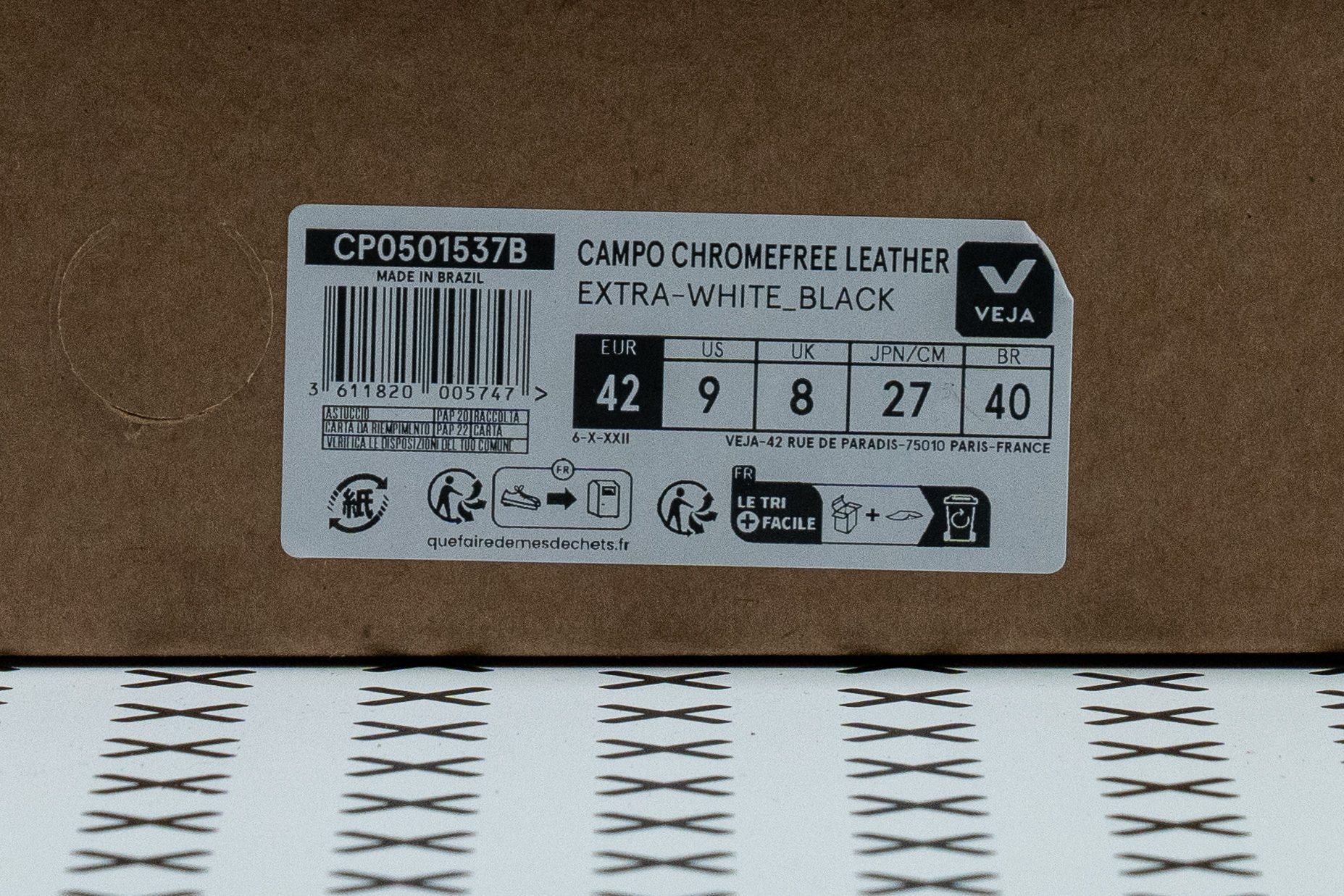
| Campo | 270.3 mm |
| Average | 272.3 mm |
Width / Fit
The VEJA Campo proves that a sleek and minimal silhouette doesn't have to be toe-numbingly snug on foot.
We filled the shoe's interiors with custom gel and waited until the mould solidified to take the measurements. Our calliper showed a standard reading of 93.3 mm in the widest part of the shoe. That falls right into the D medium width range.
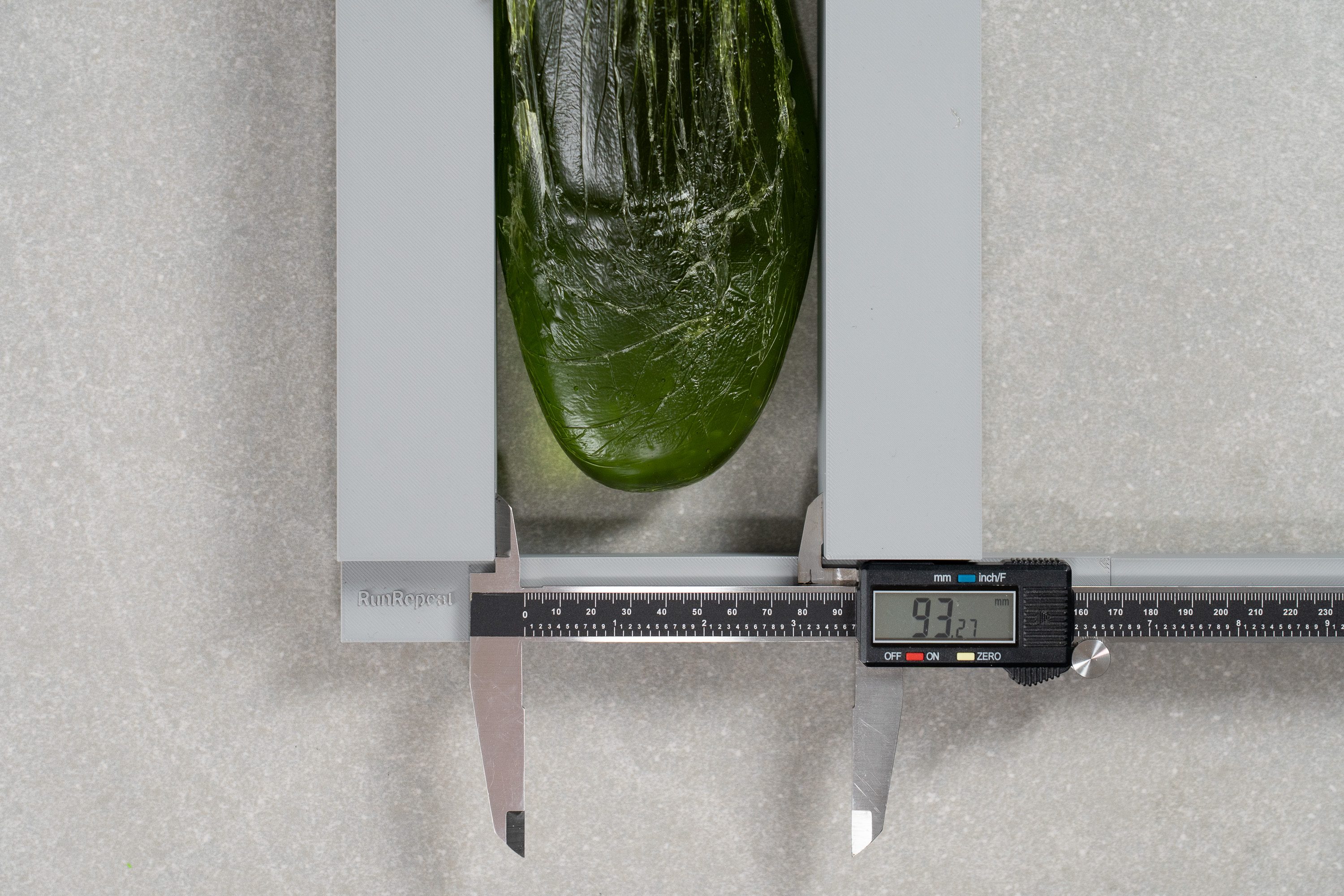
| Campo | 93.3 mm |
| Average | 92.5 mm |
Toebox width
Surprisingly, the shoe's toebox doesn't have any aggressive tapering either! It returned another regular width of 68.2 mm near the big toe, confirming this VEJA kick's standard fit.
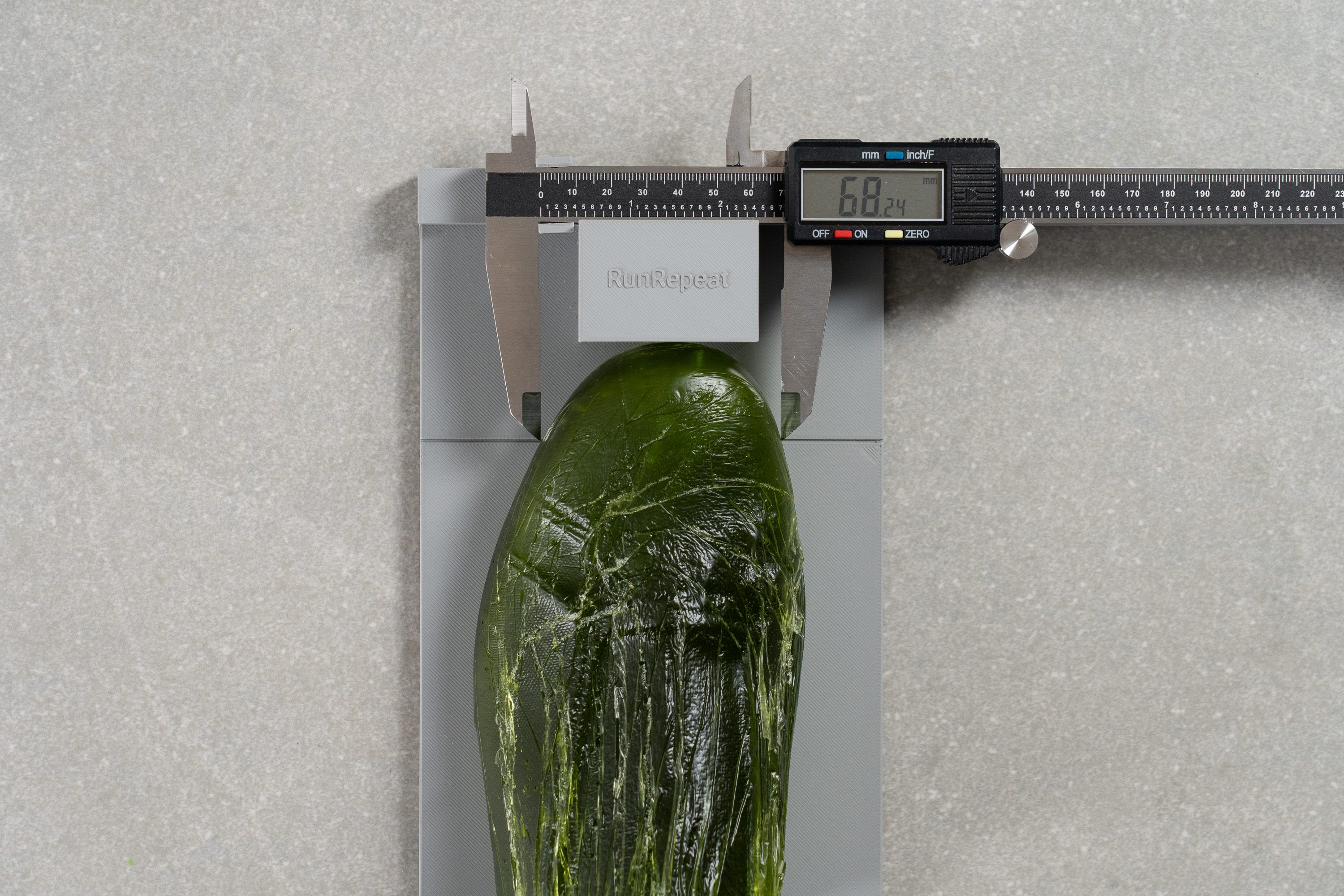
| Campo | 68.2 mm |
| Average | 68.9 mm |
Toebox height
We felt no pressure on top of the our as the Campo's toebox height also turned out to be quite tall at 29.0 mm. Even a bit taller than average.
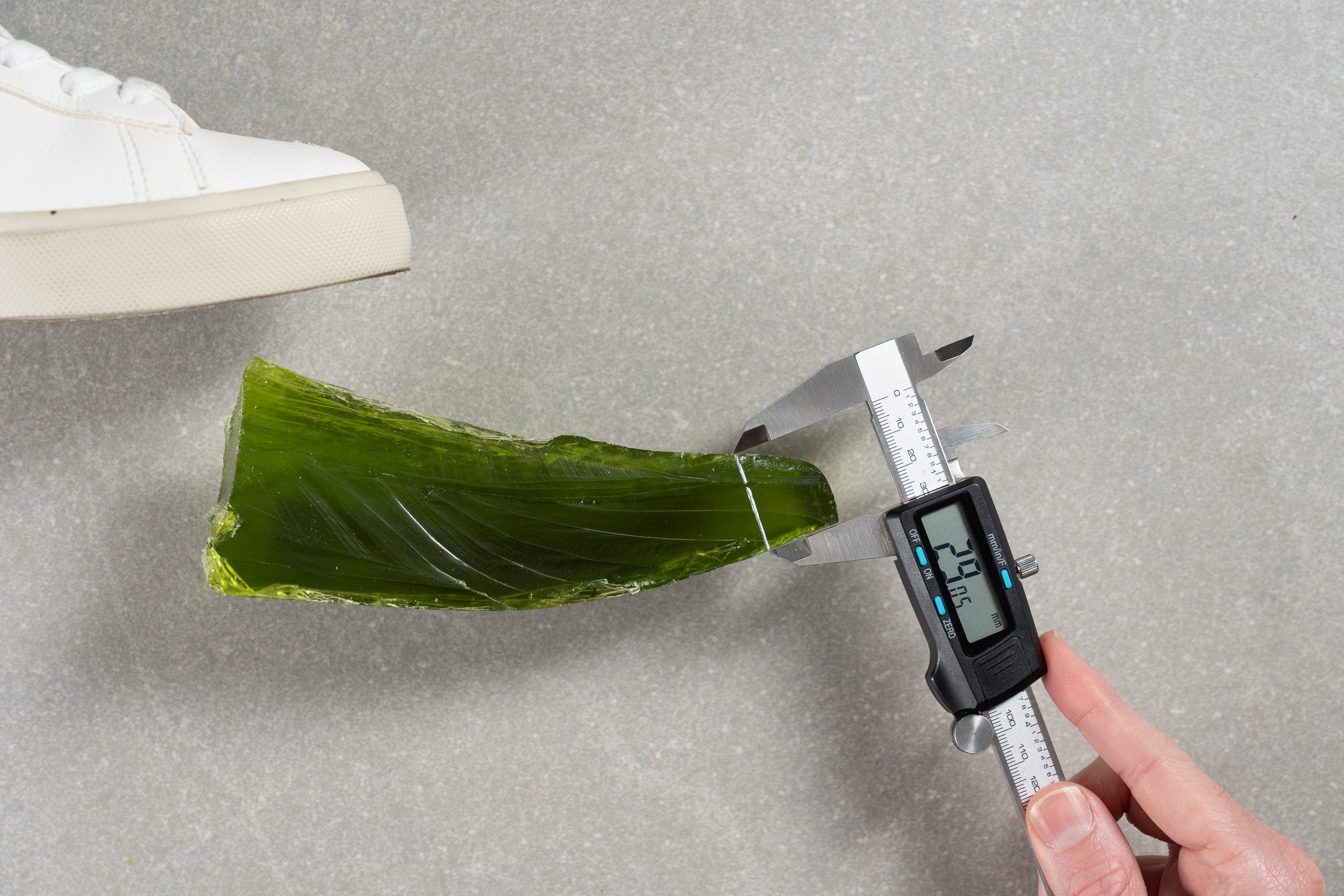
| Campo | 29.0 mm |
| Average | 27.8 mm |
Traction / Grip
The shoe's outsole traction proved to be sufficient for most day-to-day settings such as supermarket tiles.
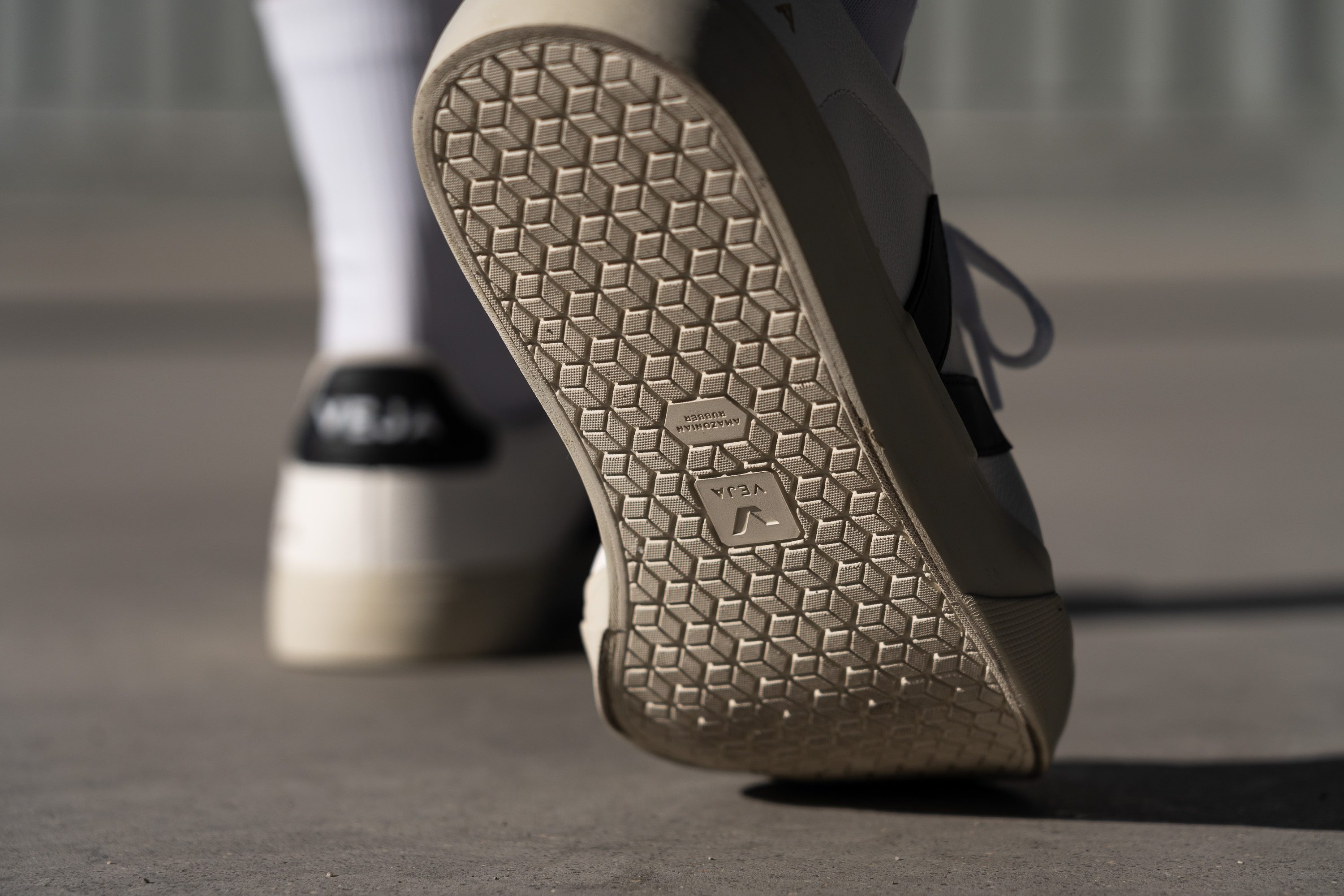
Traction test
Our lab tests confirmed that the VEJA Campo's Amazonian Rubber offers great traction in most urban settings - from concrete sidewalks to tiled shopping malls.
With a friction score of 0.46, this sneaker generates great traction upon heel landing reducing the risk of skidding. But even though the risk is low, it's never zero. So its is advisable to navigate slippery areas with caution.
| Campo | 0.46 |
| Average | 0.43 |
Outsole design
In tune with the Campo's minimalist appeal, VEJA keeps its outsole design very simple and minimal too.
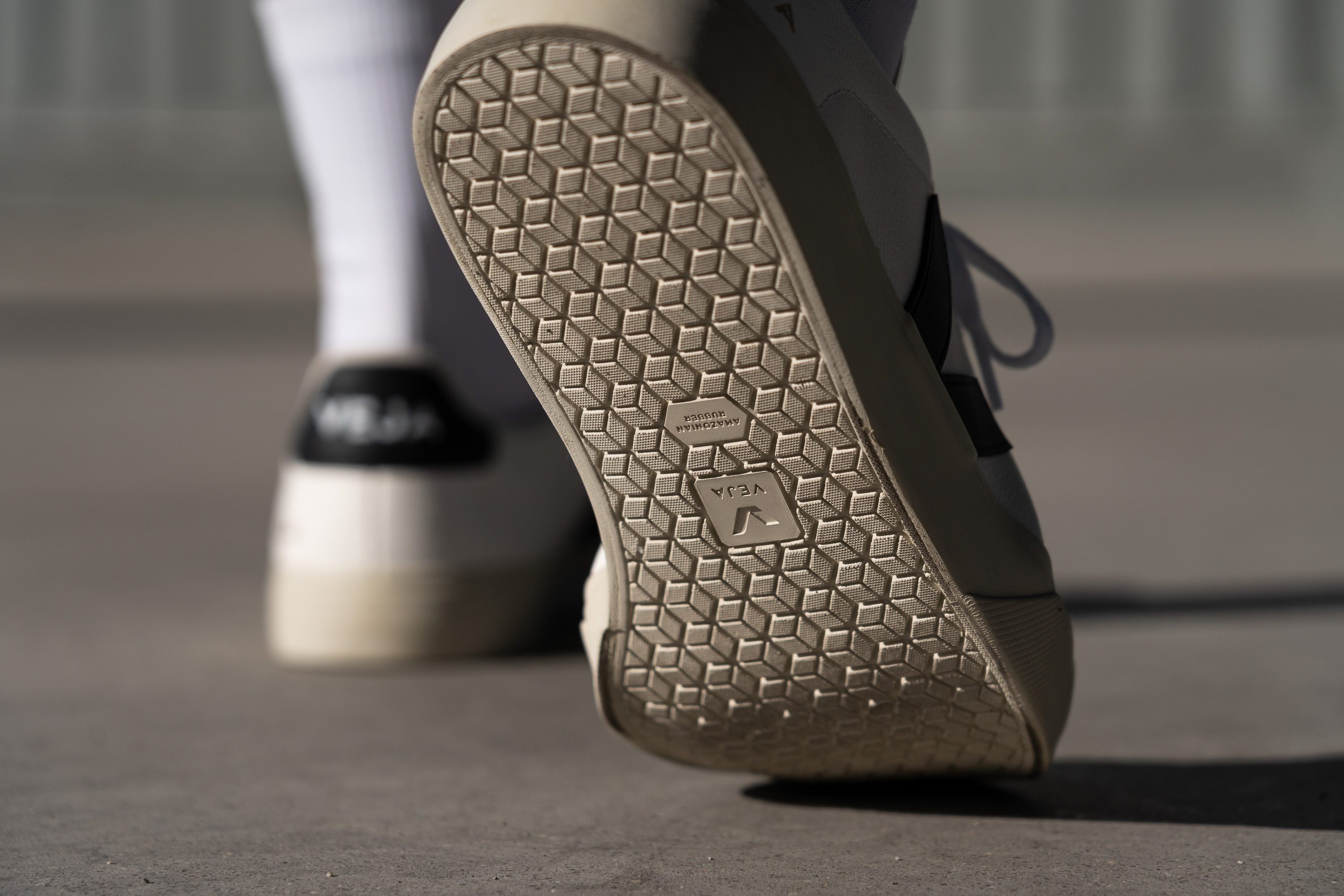
Flexibility / Stiffness
With its all-leather upper and vulcanised sole, the Veja Campo may come across as a very stiff sneaker. But we discovered that it bends much easier than most other lifestyle kicks!
Using a shoe flexibility tester, we found that it takes only 7.4N to flex the Campo to a 30-degree angle which is much lower than the category average.
One of the standout features of this Veja shoe is that it is a classy leather sneaker that feels just as comfortable as its more laid-back counterparts.
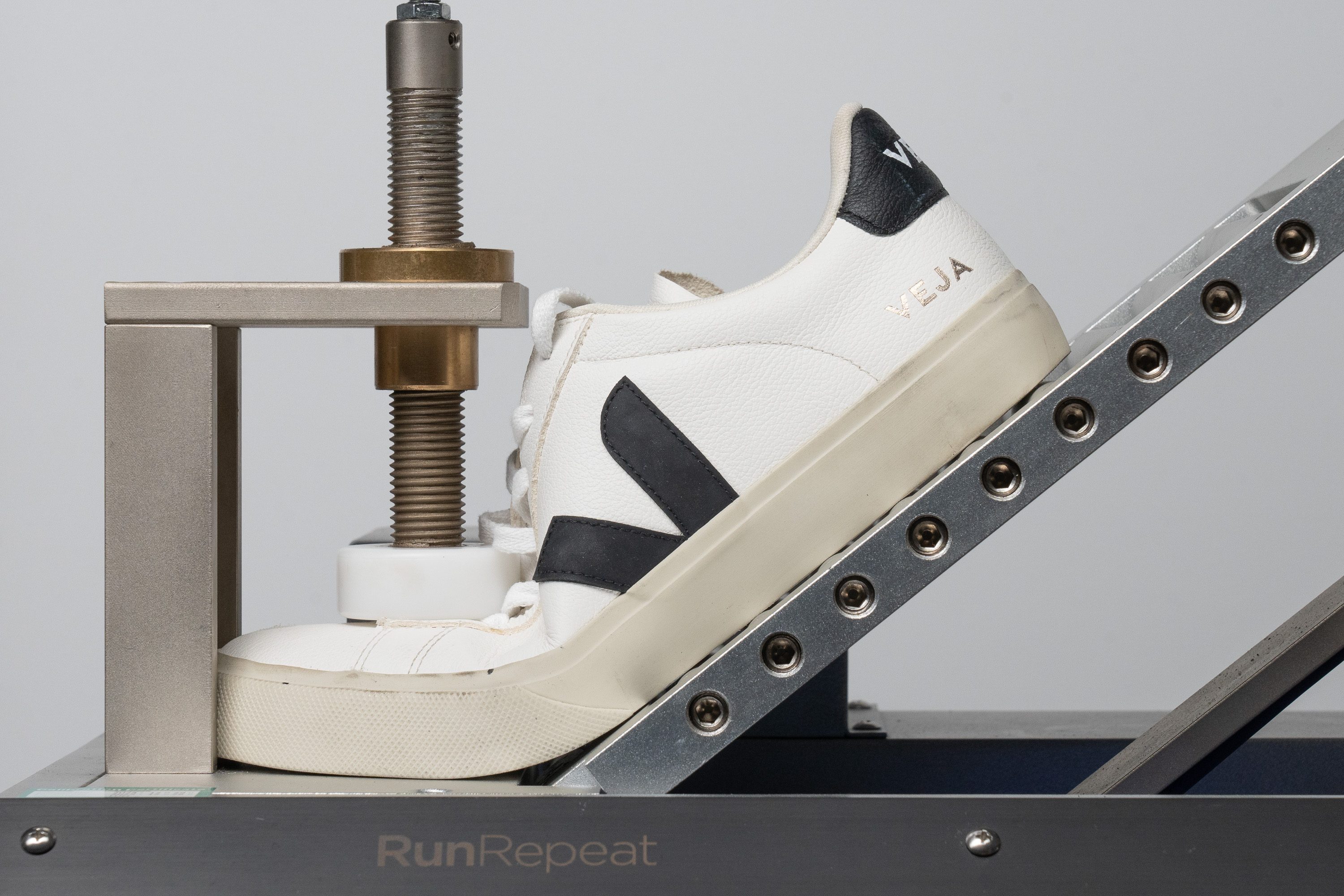
| Campo | 7.4N |
| Average | 13.3N |
Weight
Despite its all-leather upper, the weight of this Veja shoe is kept under control.
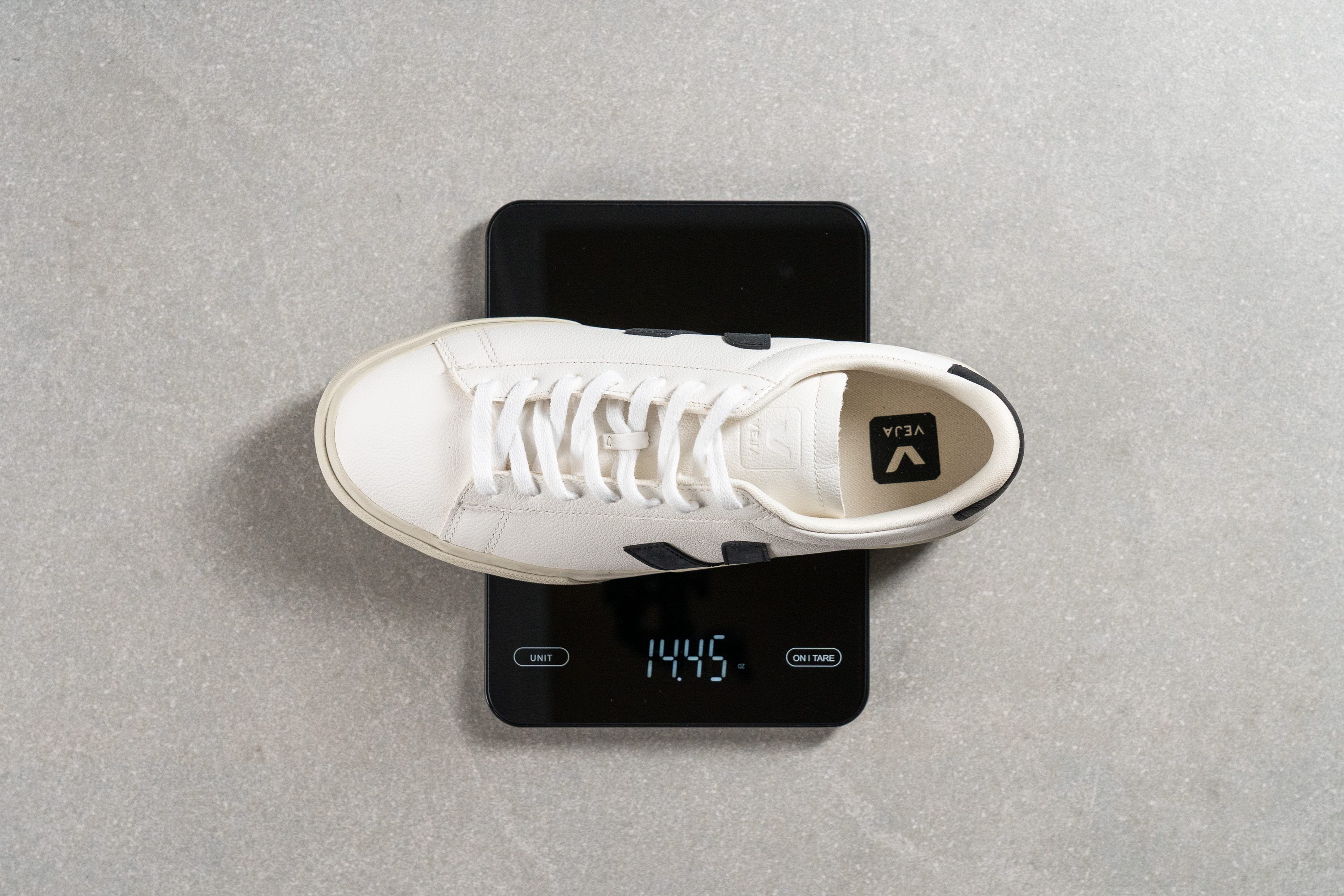
Weighing the Campo in a men's US size 9, we found it to be only slightly heavier than the average at 14.5 oz (411g).
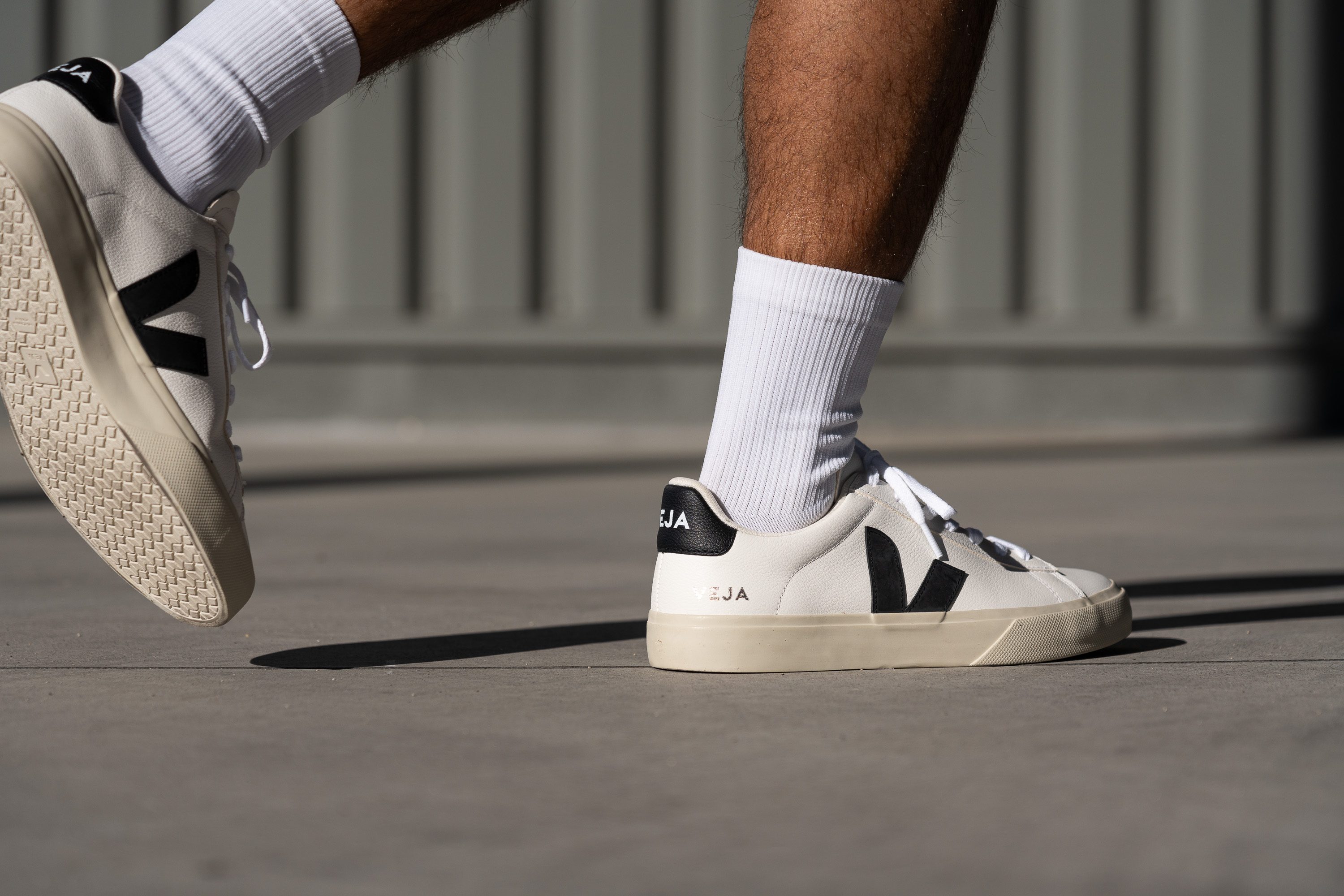
Looks like Veja is here to prove that leather trainers don't need to feel hefty on foot.
| Campo | 14.5 oz (411g) |
| Average | 13.8 oz (390g) |
Breathability
We hardly ever recommend leather trainers for warm weather and the Veja Campo is not an exception.
The shoe has zero perforations on the upper to channel the air in and out of the interiors.
On a breathability scale from 1 to 5, we rated the Campo with a low score of 2. The shoe got a bonus point because some air still finds its way inside through the collar and the gaps between the tongue and the vamp.
| Campo | 2 |
| Average | 3 |
Stability
Lateral stability test
Thanks to the shoe's very grounded and firm platform, it felt nice and planted during our wear tests. The vulcanised midsole also has a pretty high topline, contributing to the steady experience.
Torsional rigidity
Other than that, the Veja Campo doesn't have any stabilising components to make it feel rigid.
We were able to twist the shoe almost effortlessly in our manual test. On a 1-5 stiffness scale, where 1 is the most flexible, the shoe's pliability earned it a low score of 2.
| Campo | 2 |
| Average | 3.6 |
Heel counter stiffness
There is not much stiffness in the shoe's heel counter either.
Giving it a good push and squeeze in our manual test, we rated the heel counter stiffness with a moderate score of 3.
How does that feel on foot? The shoe's rearfoot doesn't feel floppy but it doesn't really participate in stabilising the heel either. So if you have a severe case of overpronation, it won't stop the heel from sliding inwards.
But most people should feel comfortable with this amount of heel counter stiffness.
| Campo | 3 |
| Average | 3.2 |
Midsole width - forefoot
Veja also keeps the Campo's platform width minimal. It's neither particularly narrow nor wide.
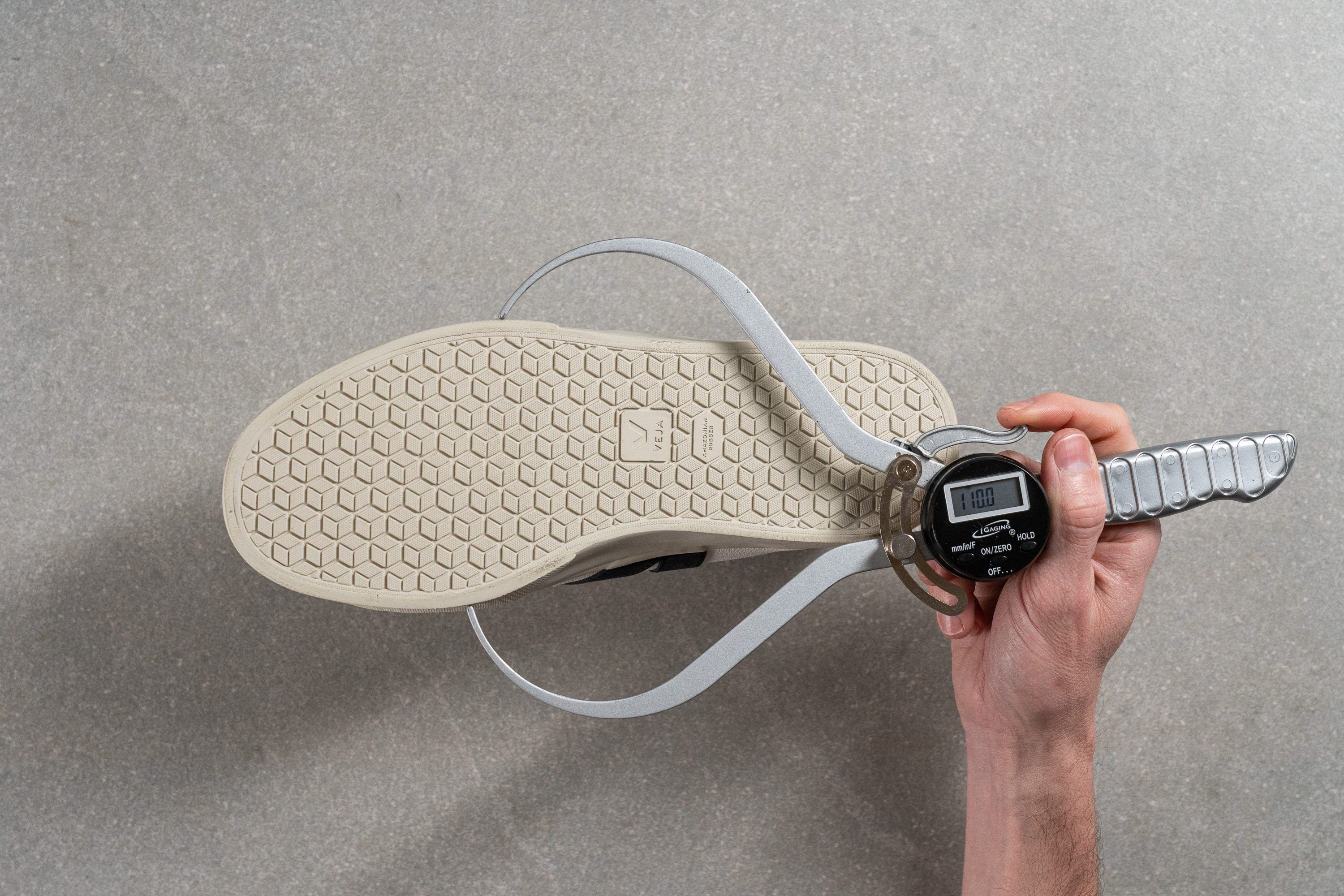
Measuring the sole width between the shoe's most distant contact points, our calliper showed 110 mm. That's on par with the average forefoot width of casual trainers.
| Campo | 110.0 mm |
| Average | 108.9 mm |
Midsole width - heel
We also discovered that the shoe's heel width is just about the same as the average. Our calliper showed 81.1 mm in the widest area.
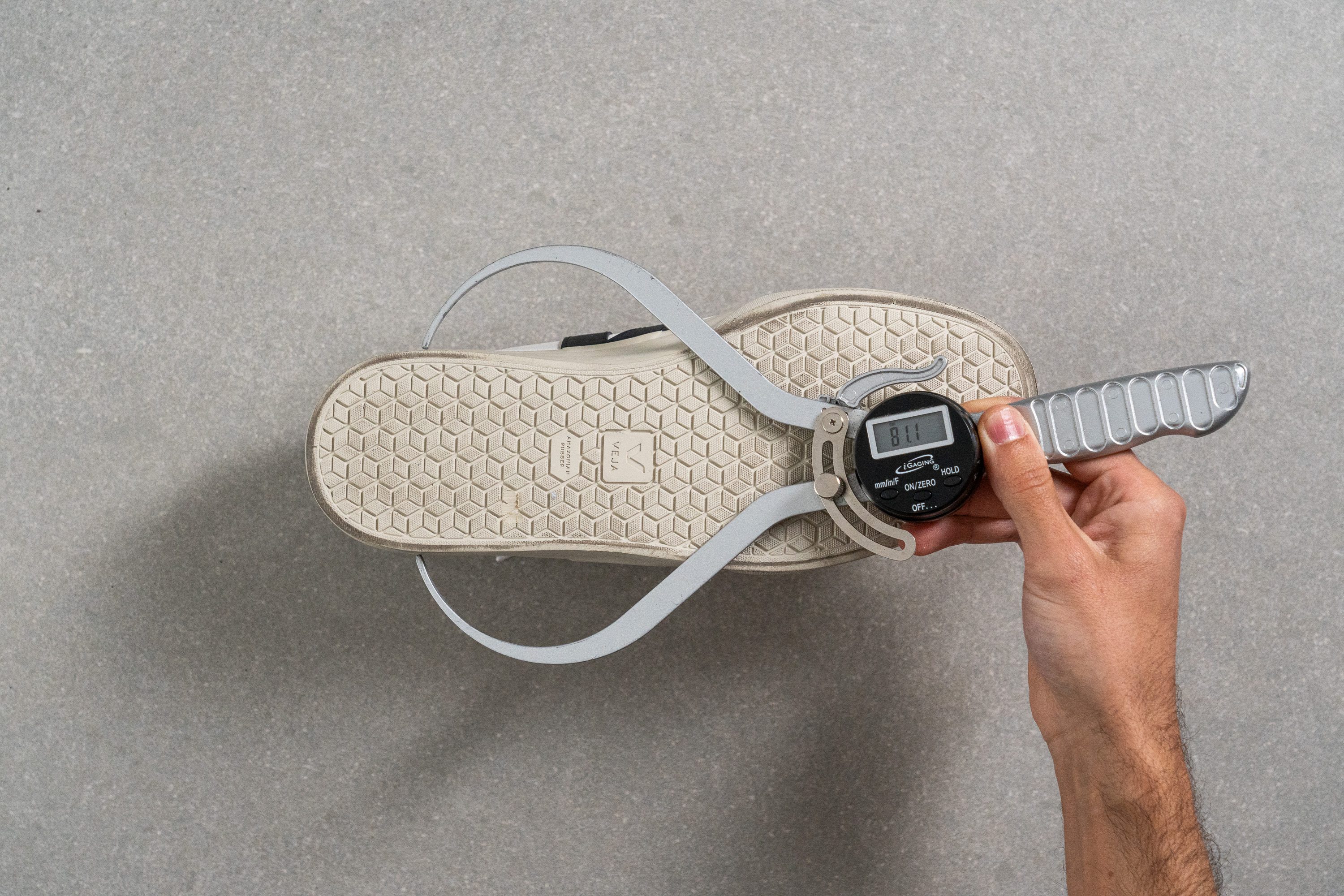
| Campo | 81.1 mm |
| Average | 84.0 mm |
Durability
Leather/Suede quality
We believe that one of the primary reasons for choosing Veja trainers is their premium-class leather (or suede).
In this review, we are looking at the Veja Campo Chromefree Leather but you can also opt for the Chromefree Suede or Canvas options.
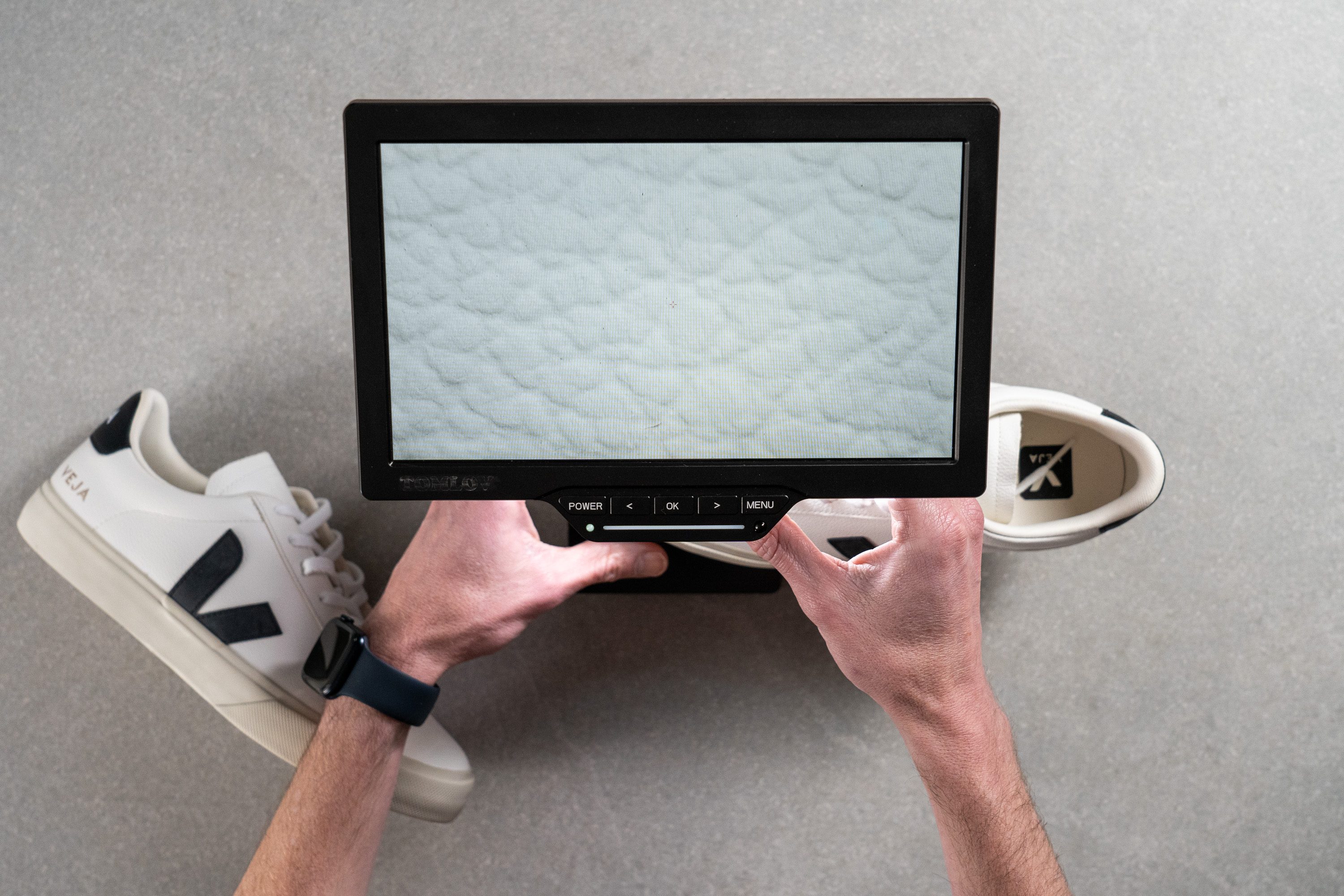
The word "Chromefree" indicates that the company uses a more expensive but higher quality and environmentally friendly tanning process. We guess is that it is vegetable tanning but it might as well be the brand's proprietary technology. According to Veja, "no chrome, heavy metals, or dangerous acids are involved."
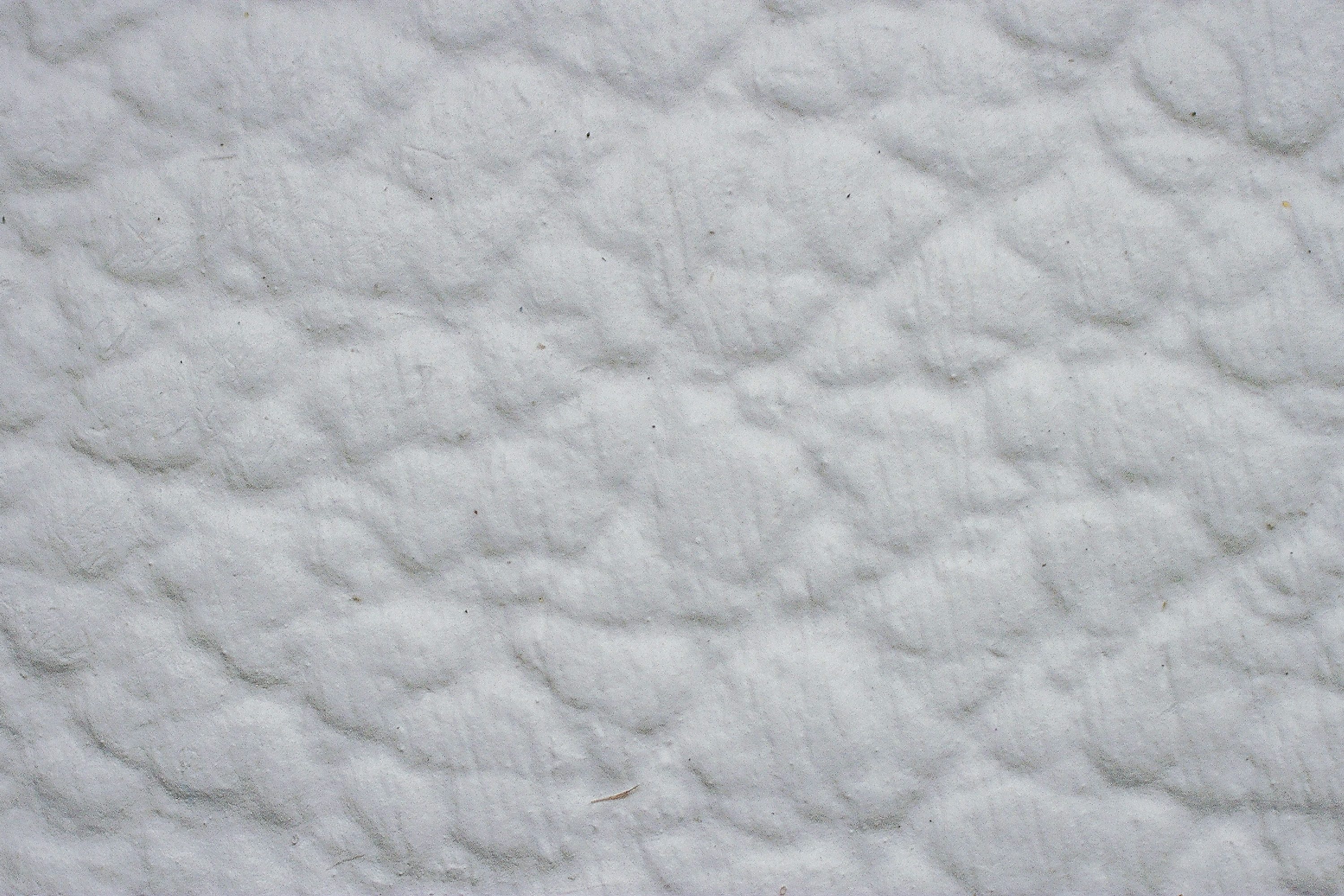
Checking the shoe's bovine leather under the microscope, we found its texture to be real, not artificially embossed like it is on the cheaper trainers.
Another approach we use to check if the leather is real is exposing it to fire using a butane torch. As you can see, the Campo's leather did not catch fire nor did it melt down like synthetic material would.
Applying the same test to the shoe's heel collar patch, we found that it's made of genuine leather as well. Veja doesn't skimp on material quality even in the details!
P.S. If you wish to maintain the shoe's leather in its best condition, the brand recommends occasionally wiping the upper with a wet cloth and applying a special leather care product every once in a while.
| Campo | Real leather |
Toebox durability
We expect nothing but stellar quality from high-priced leather shoes and the Veja Campo delivers exactly on point.
Using sandpaper, we tested the limits of the shoe's leather for 12 seconds at 5K RPM. And all it did to the material was just a minor scuff!
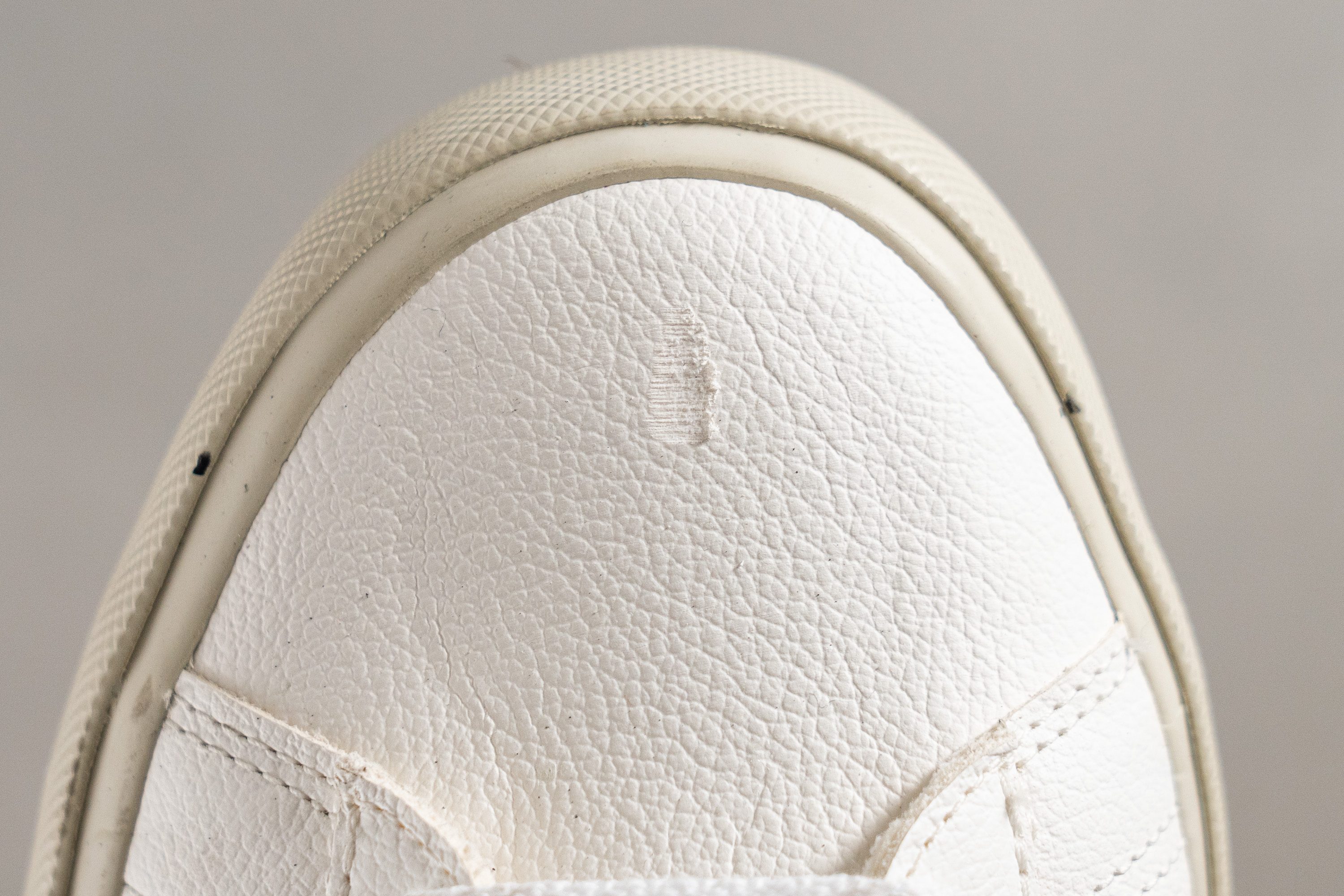
That's not enough to deduct even one point from the shoe's toebox durability. The Campo scores a perfect 5 out of 5 on this test!
| Campo | 5 |
| Average | 3.7 |
Heel padding durability
If you have reservations about the durability of recycled materials, Veja trainers will most likely vanish those.
Featuring 100% recycled polyester for its inner lining, the Campo managed to score high on yet another durability test.
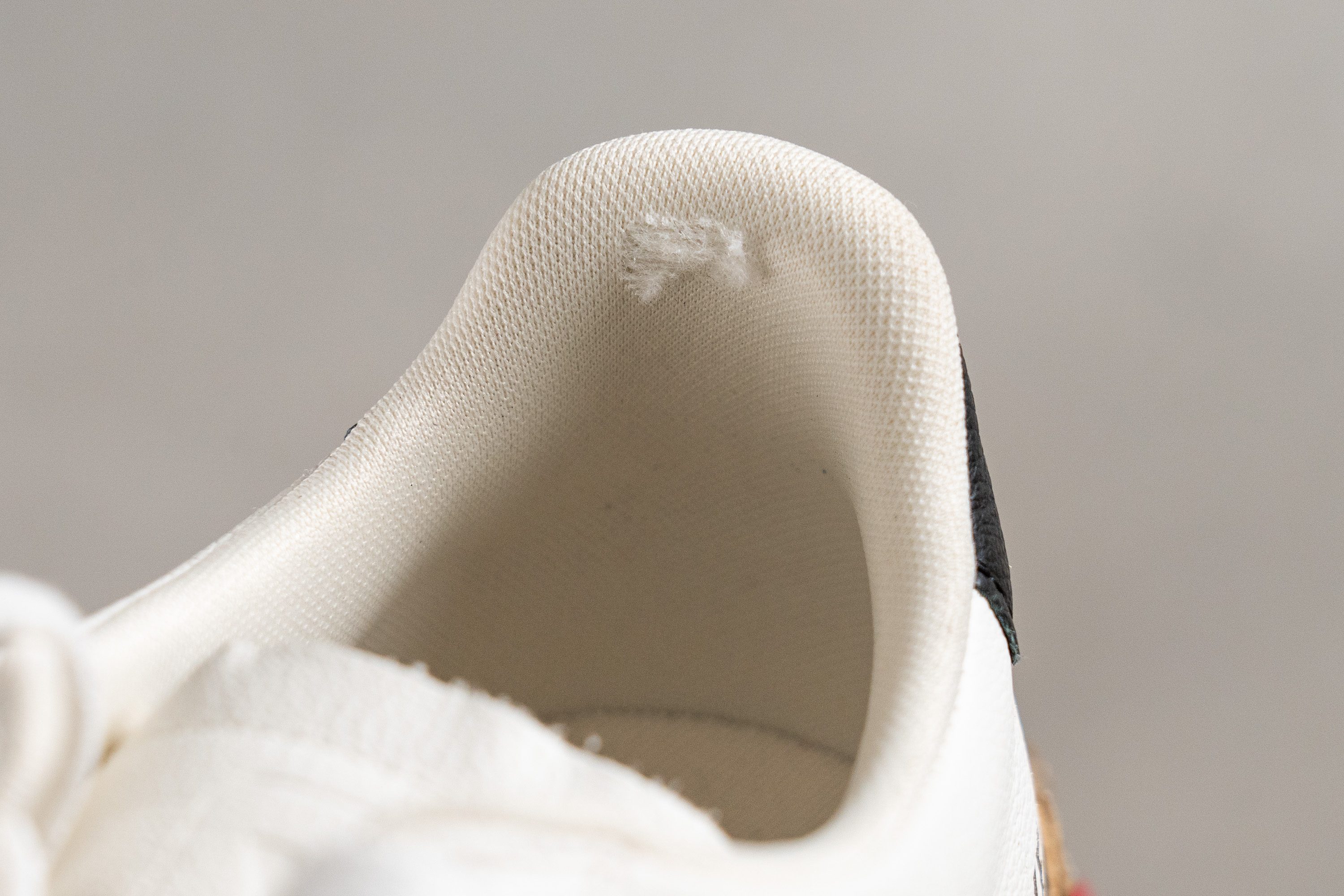
After 4 seconds of drilling, the damage on the heel padding was very minor. It was, in fact, smaller compared to the average results we see in our lab.
Thus, we readily rate the shoe's heel lining durability with 4 out of 5.
| Campo | 4 |
| Average | 3.2 |
Outsole hardness
It is expected that Veja also uses ethically sourced materials for the Campo's outsole. But how does it compare to standard rubber outsoles?
A mix of Amazonian rubber, silica mineral, and recycled rubber, among other non-listed components, makes for a moderately hard compound.
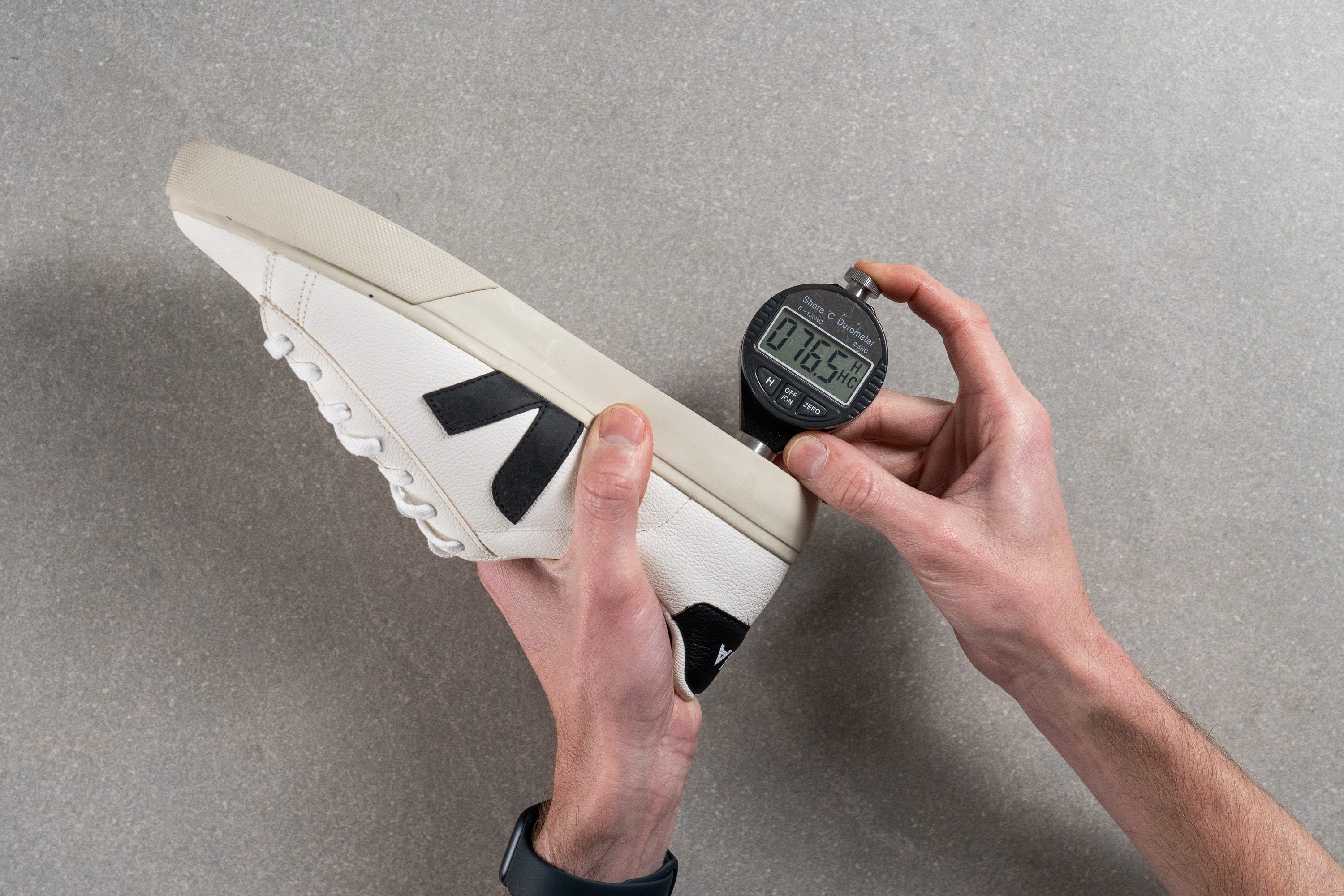
Our Shore C durometer showed a lower-than-average reading of 76.5 HC, indicating a slightly softer material. It is 10% softer than the average sneaker rubber, to be precise.
Let's see if that affects its ability to resist abrasion.
| Campo | 76.6 HC |
| Average | 85.7 HC |
Outsole durability
To our pleasant surprise, it does not!
Having applied our Dremel to the same spot on the Campo's outsole for 22 seconds at a high 10K RPM speed, we observed a merely standard amount of damage.
The sandpaper failed to drill any deeper than 1.1 mm! That's a regular dent depth among our lab-tested trainers.
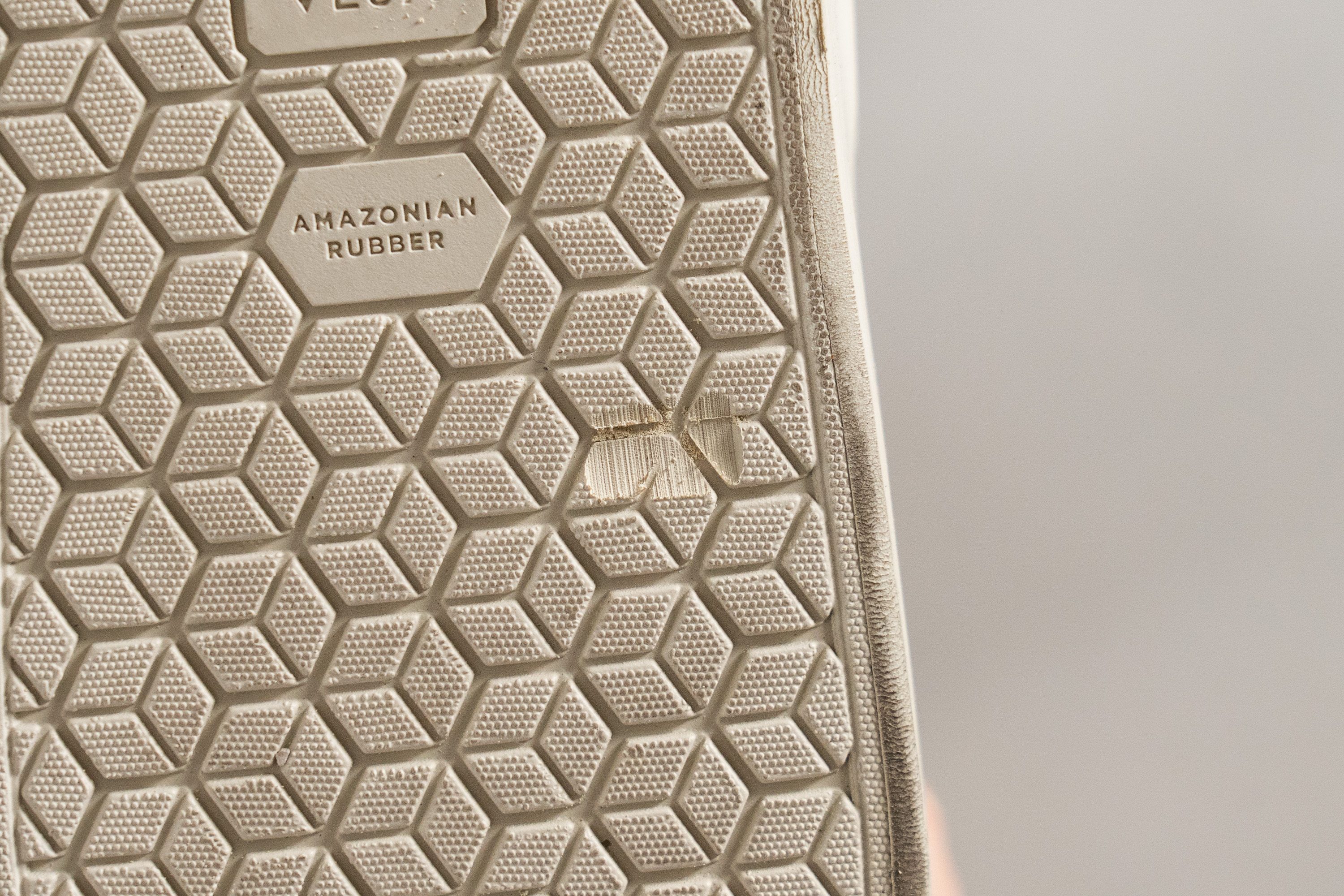
This gives us confidence in the shoe's ability to last a good while.
| Campo | 1.1 mm |
| Average | 1.1 mm |
Outsole thickness
Let us also take into account the thickness of that rubber compound.
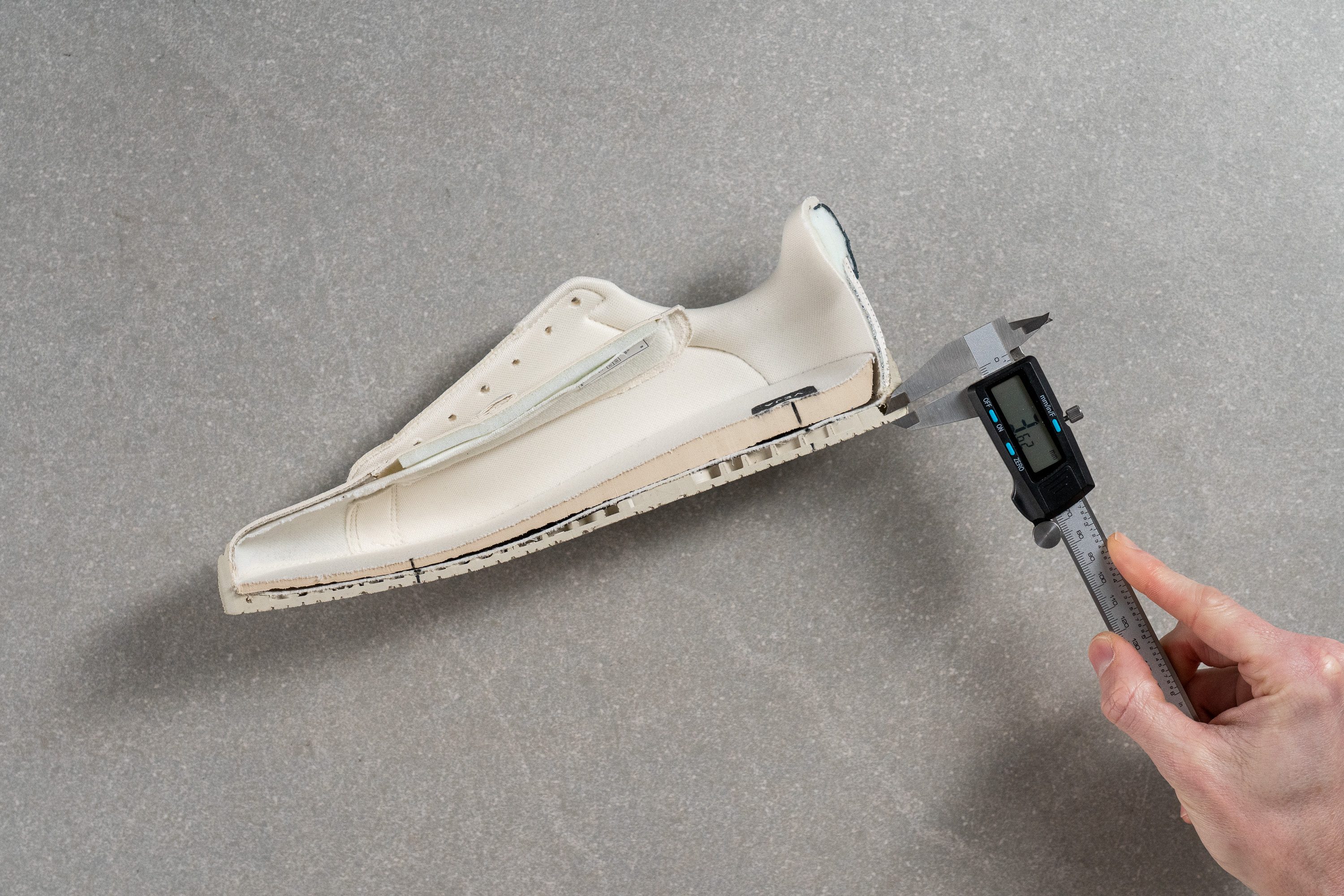
Even though it is thinner than some other sneaker outsoles, it has a trusty rubber layer of 3.6 mm.
We expect the shoe's outsole to last as long as your typical daily sneaker.
| Campo | 3.6 mm |
| Average | 5.3 mm |
Misc
Insole thickness
But don't worry, the shoe won't feel like a brick thanks to the stunningly cosy and padded insole. Measuring its thickness in the heel, our calliper showed 11.5 mm which is 6 mm thicker than the standard insole!
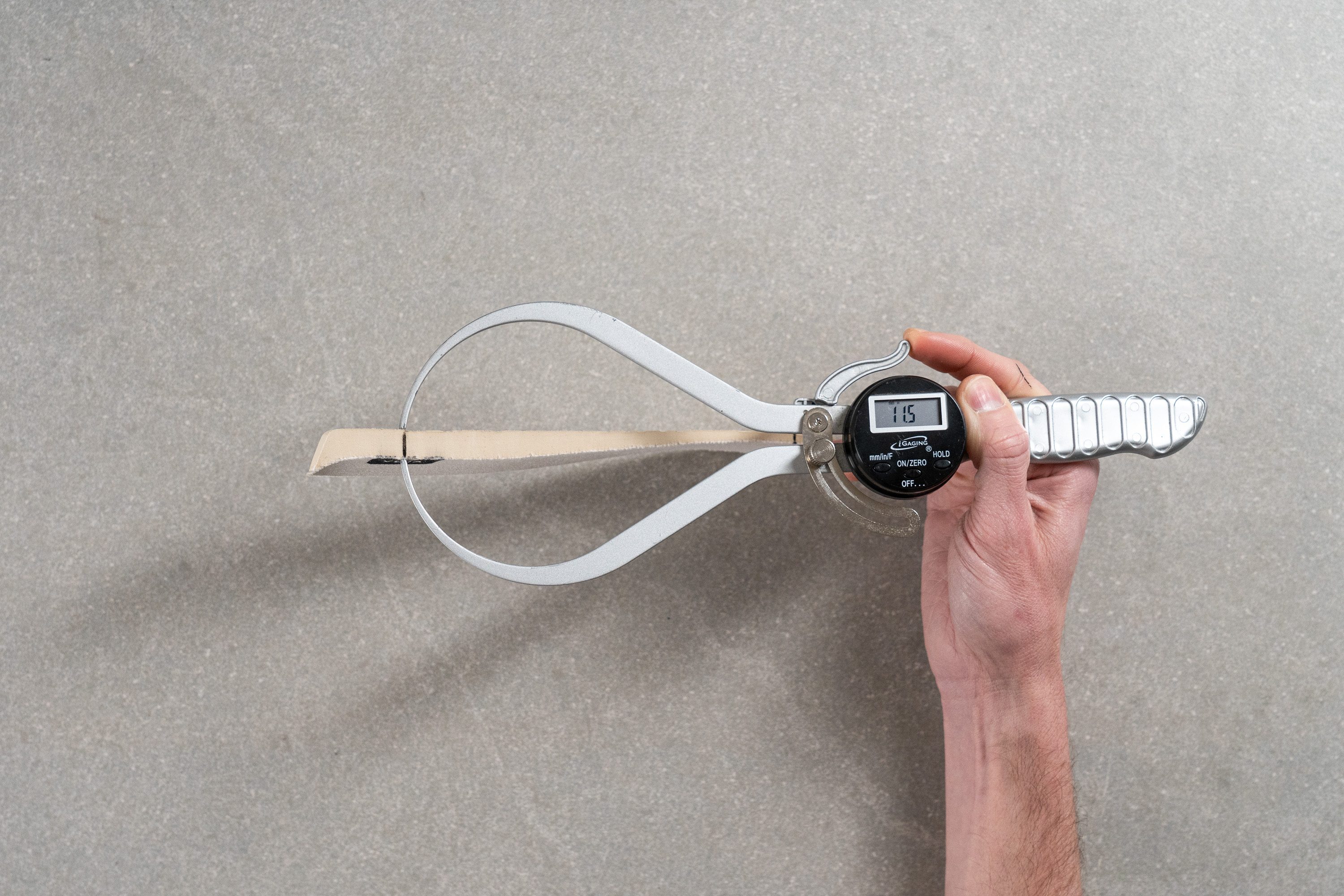
But unlike other insoles, it works as part of the shoe's primary cushioning as opposed to being a welcome add-on. It is responsible for making the step-in feel rather pleasant in this Veja shoe.
Like most other parts of the Campo, the insole is made of eco-friendly materials including Amazonian rubber, sugar cane-based EVA, and organic cotton, among other components.
| Campo | 11.5 mm |
| Average | 5.1 mm |
Removable insole
Even though the Campo's stock insole can be removed, we wouldn't recommend replacing it because it is so thick and functions as a key part of the shoe's cushioning setup.
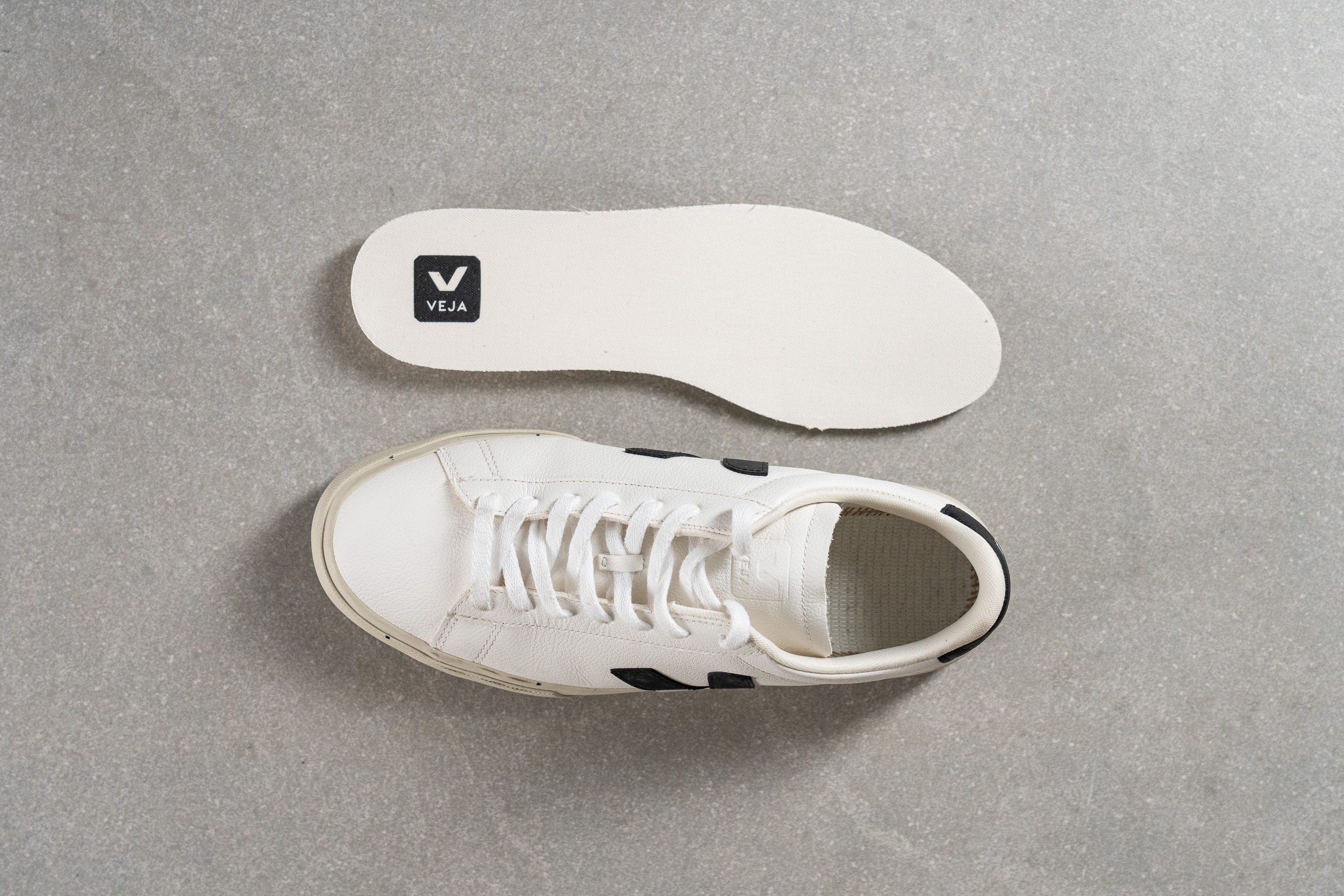
| Campo | Yes |
Reflective elements
There are no 3M or reflective elements on the Campo's upper.
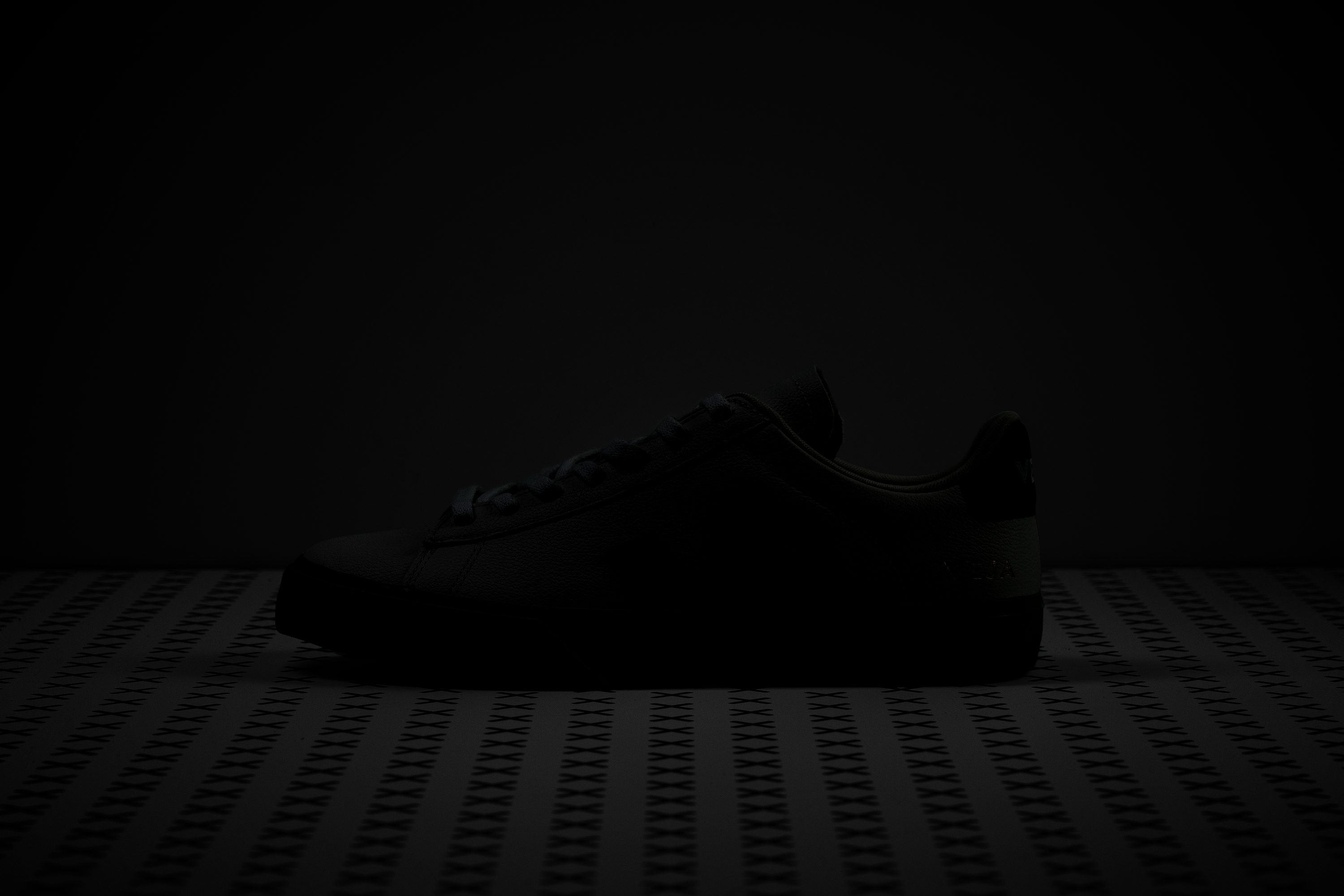
| Campo | No |
Tongue padding
The Campo's tongue is rather moderately padded. It has 6.0 mm of foam based on our calliper measurement.
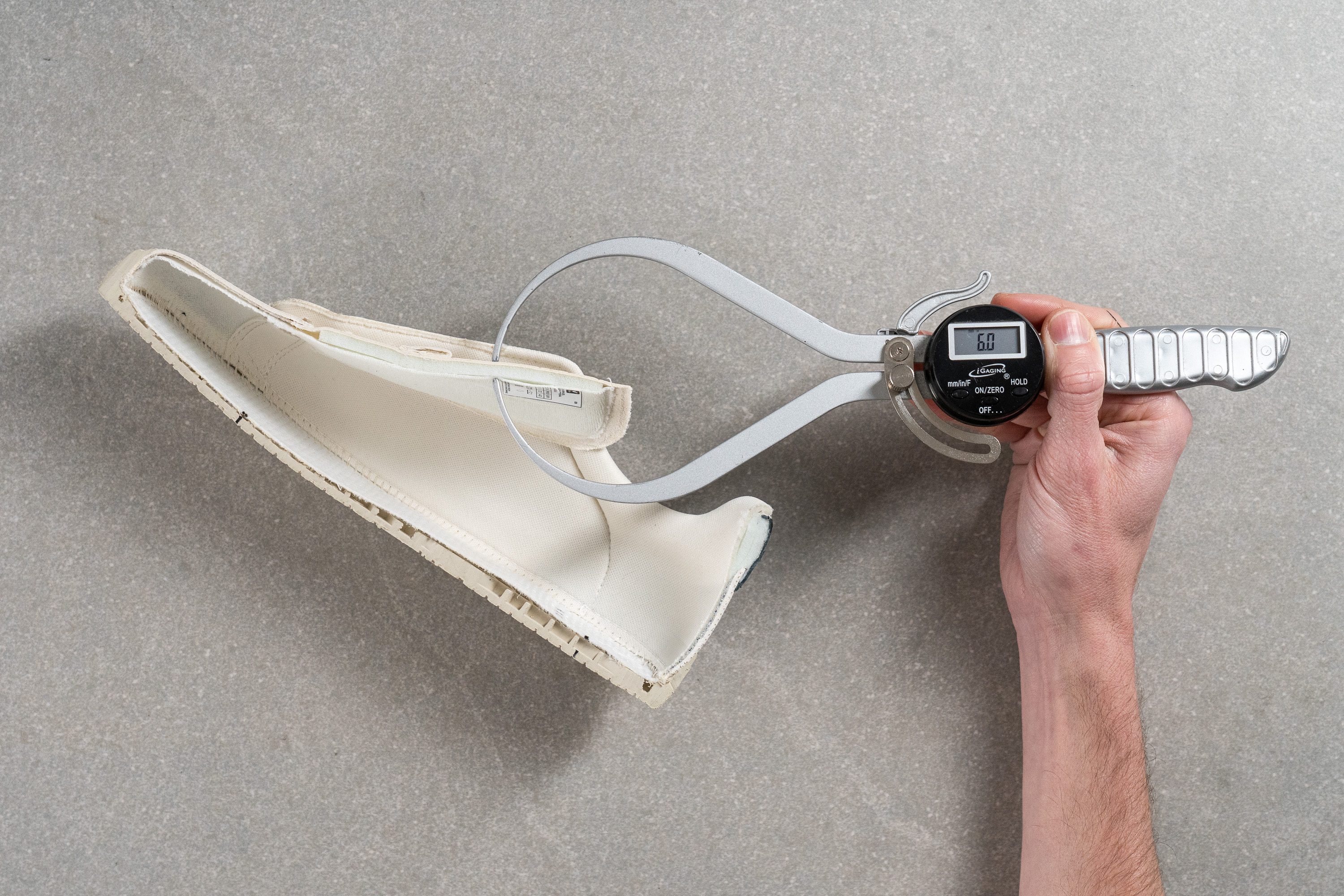
We are glad that Veja keeps its designs simple and minimal wherever possible.
| Campo | 6.0 mm |
| Average | 9.6 mm |
Tongue: gusset type
This Veja shoe features a classic design in which the tongue is not gusseted (not attached to the upper on the sides).
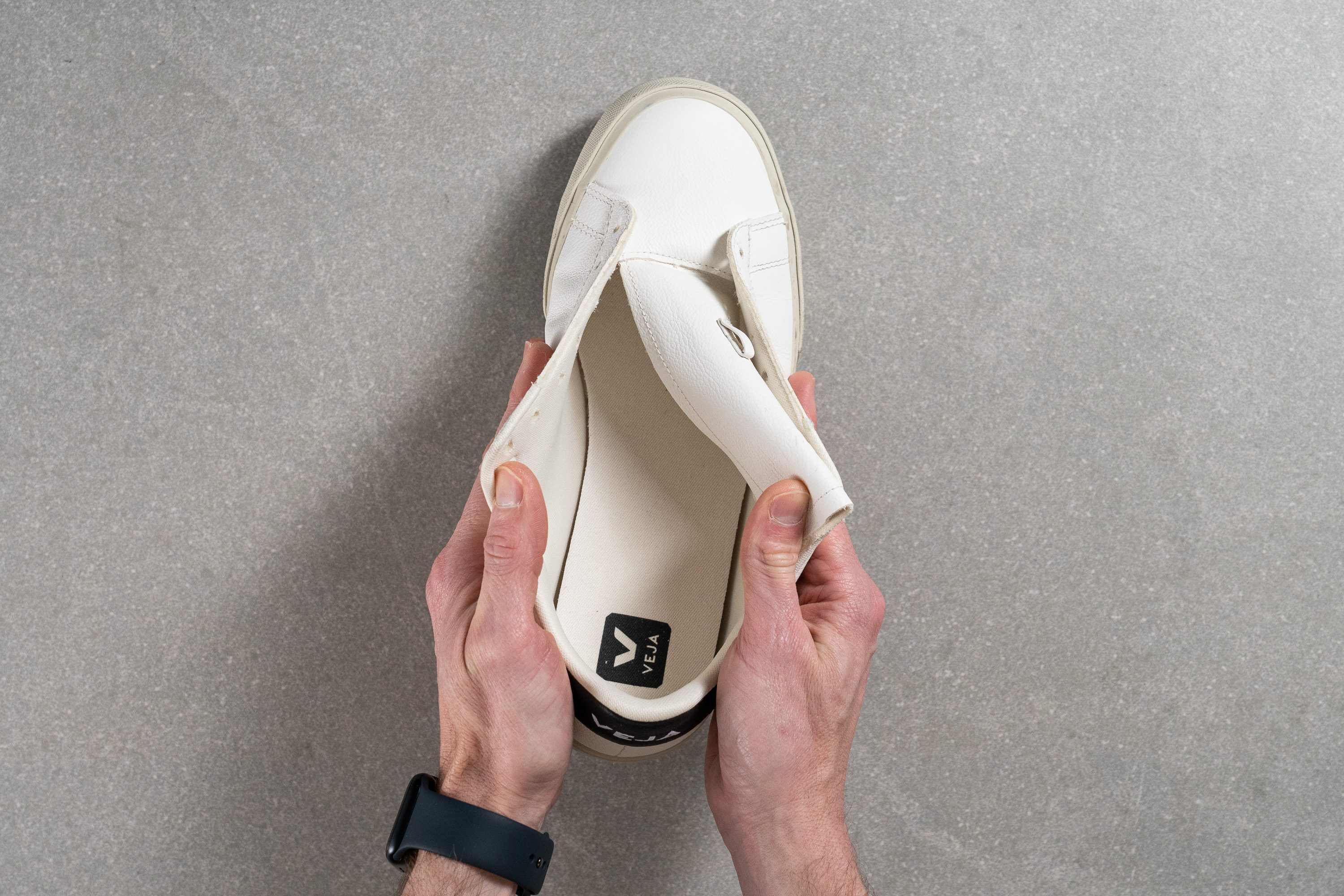
If you've seen other people wearing this Veja silhouette on the street, you may have noticed that their shoe tongues are slipped to the side. Some people do that on purpose because the Campo's tongue is pretty long and tends to dig into the ankle.
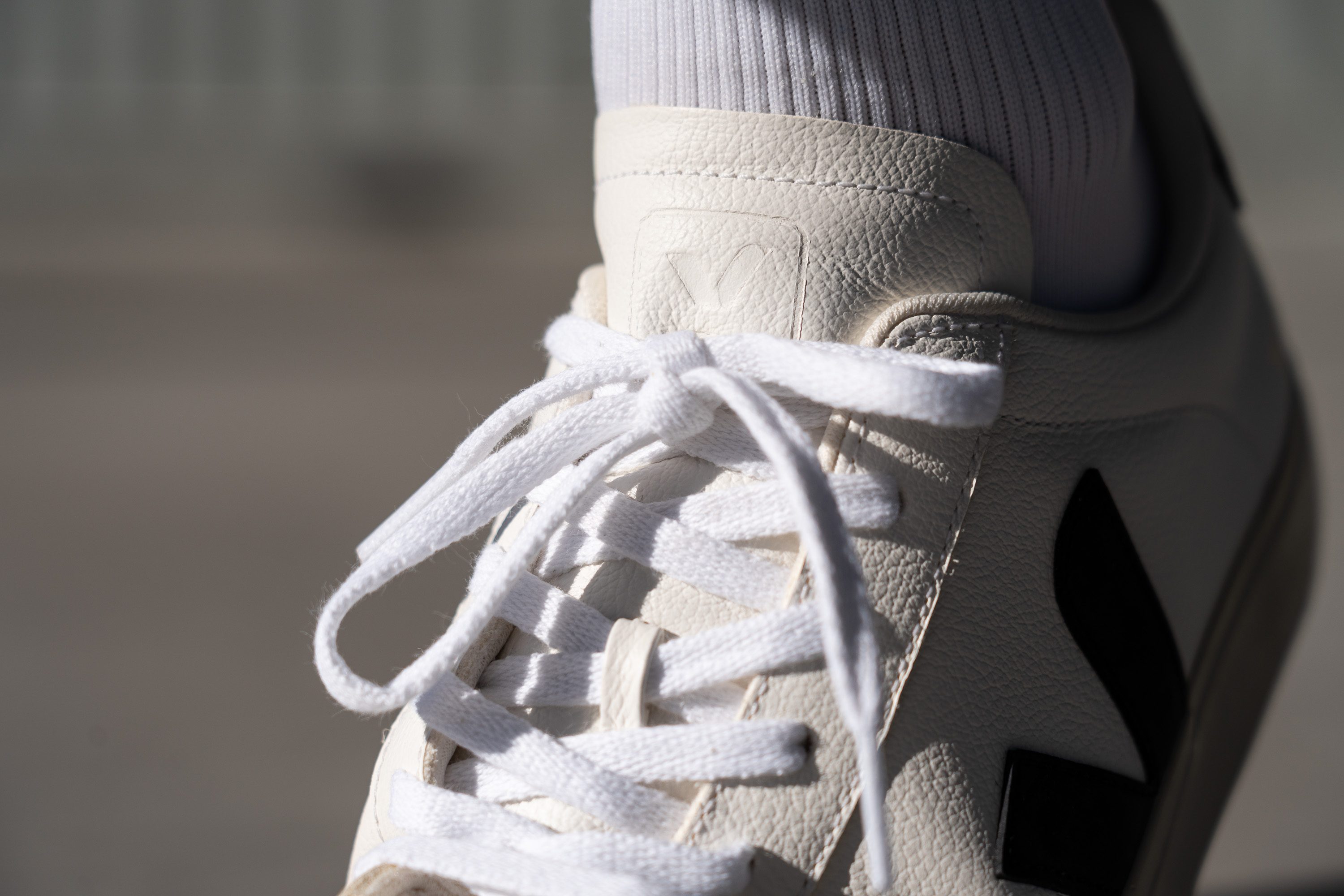
But if you're not happy with this little workaround, another option to avoid chafing is to leave the top pair of eyelets unlaced or have the tongue cut by a cobbler.
Either way, we don't think that such an expensive pair of shoes should require so much hassle.
| Campo | None |
Heel tab
There are no pull tabs or finger loops but you can hold onto the shoe's slightly extended heel collar to assist the on-and-off.
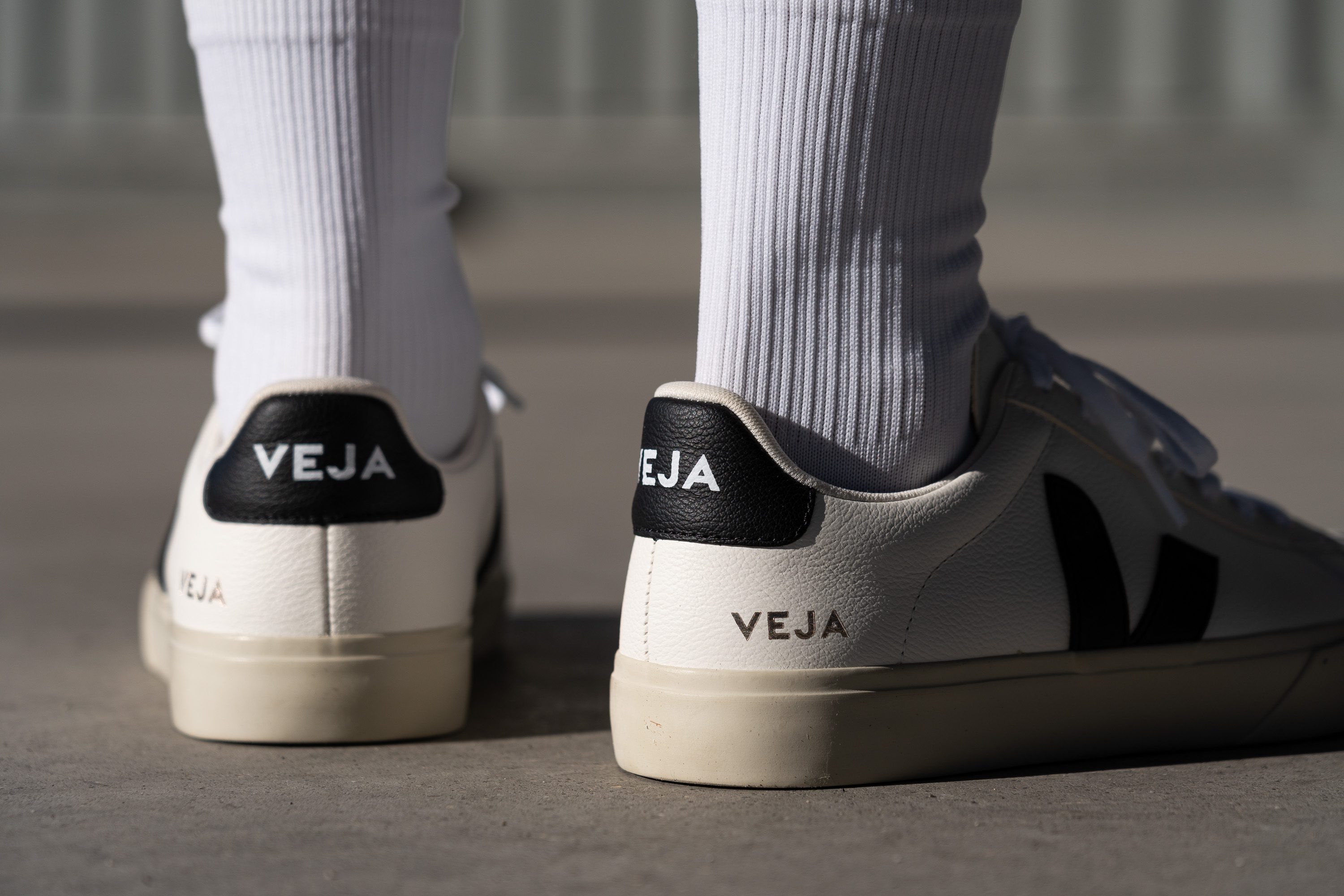
However, we do recommend using a shoehorn if you want to prevent wrinkles on the shoe's leather for as long as possible.
| Campo | None |
Background
Veja prides itself as the world’s very first sustainable sneaker brand. It uses ethically sourced materials from Brazil and follows environmentally friendly manufacturing processes.
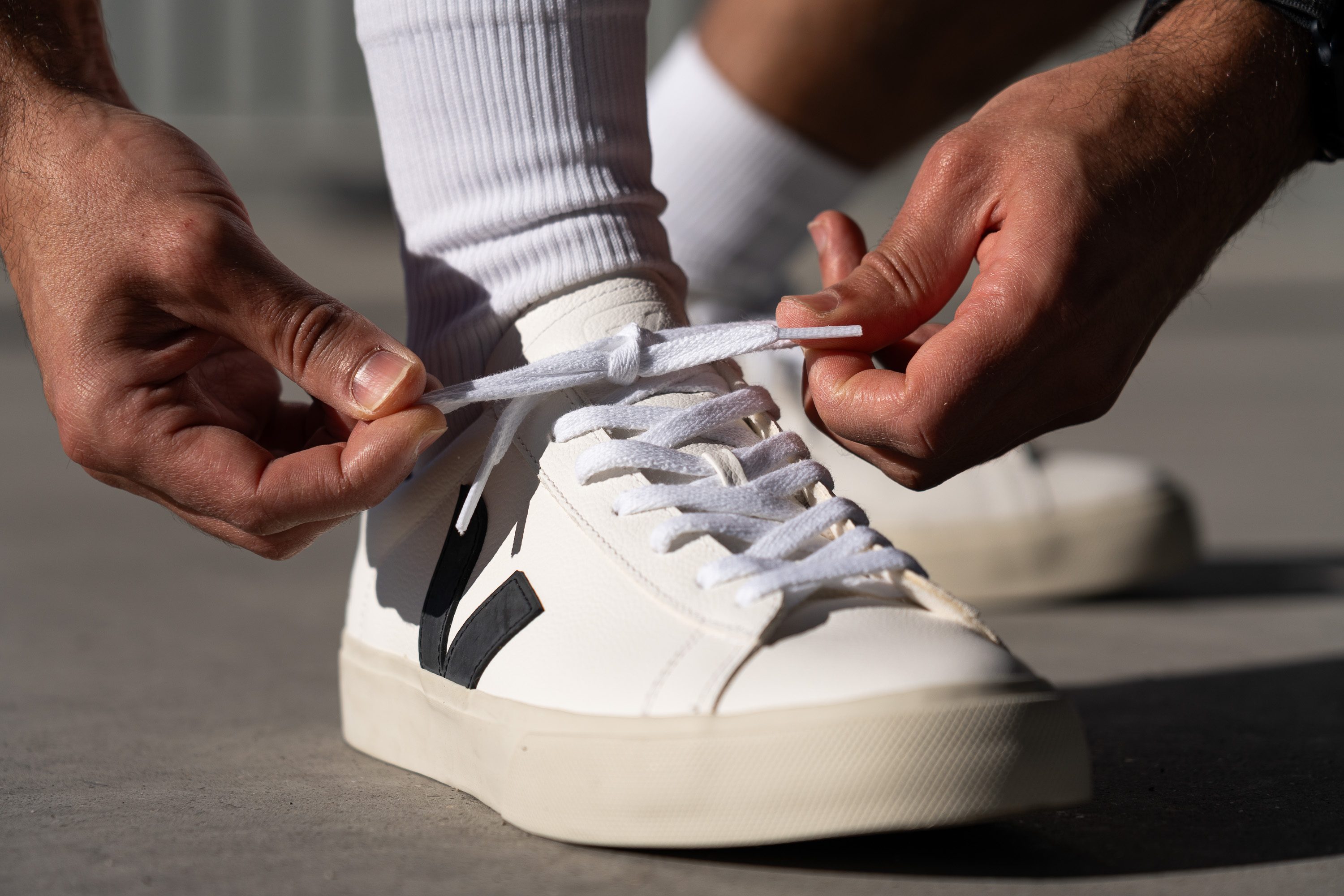
Spotted on the feet of Emma Watson and Megan Markle around 2018, Veja quickly gained traction among the public.

